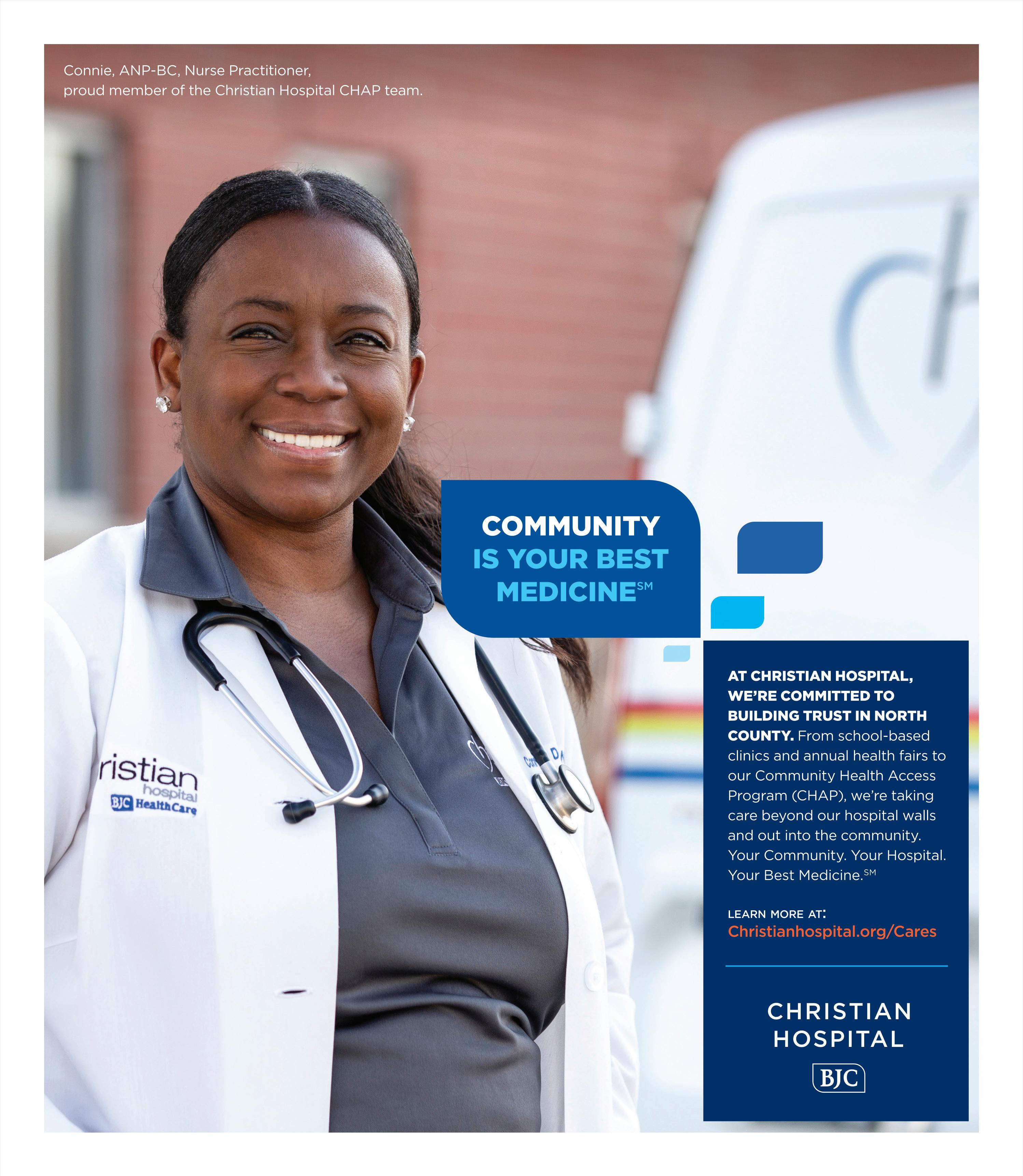






By Sylvester Brown Jr.
n “I’m accepting this award for the Williams Family and the tradition of providing medical care for the community.”
– Dr. Jerome Williams, Jr.
He compared his “Salute to Excellence” recognition to that of St. Louis American Publisher Dr. Donald M. Suggs, and the longevity of the newspaper. “Just like the dedication I have to improving healthcare in the city, I look upon the St. Louis American as
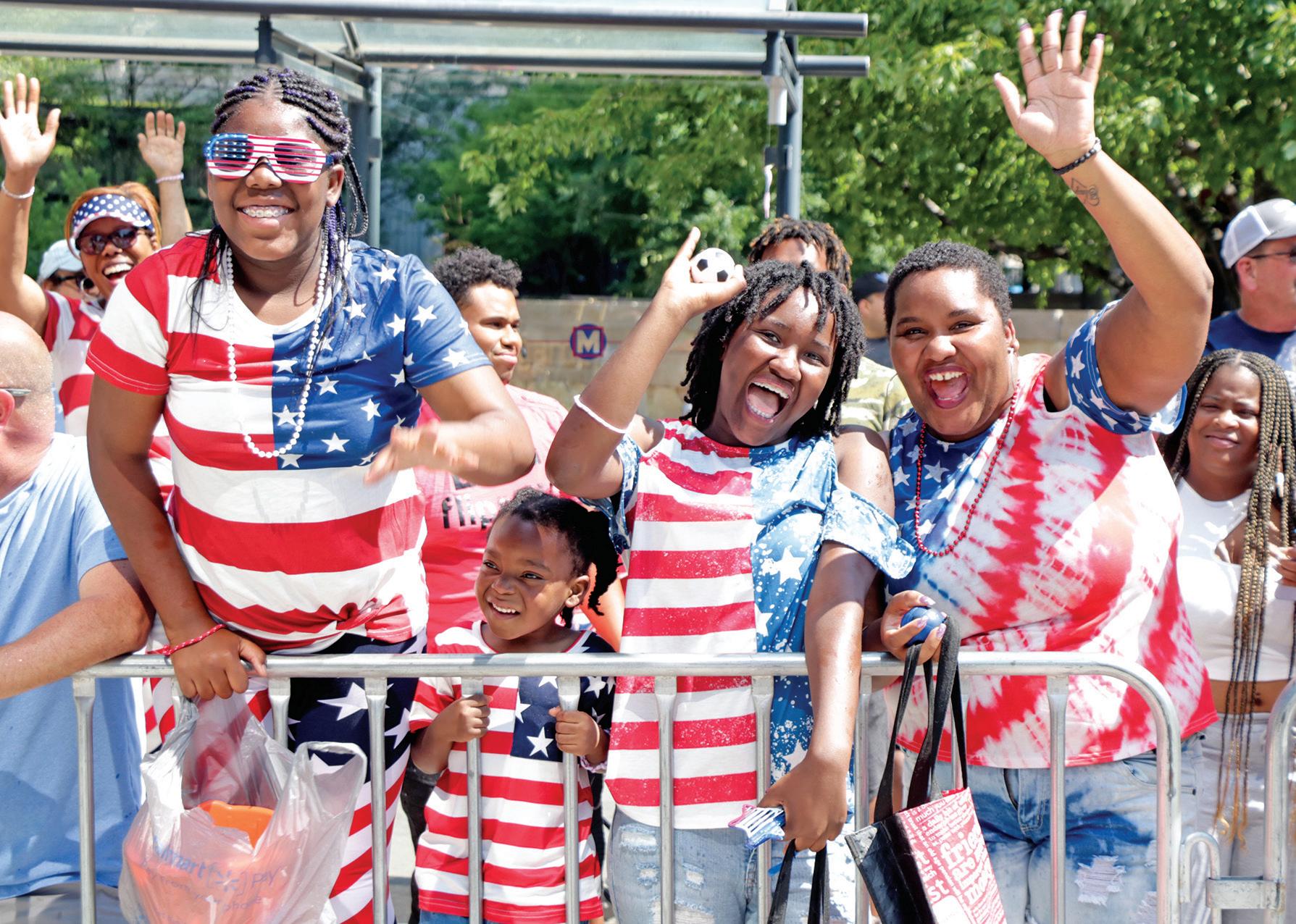
While many African Americans participated in or were spectators at America’s Birthday Parade in downtown St. Louis, Mayor Tishaura Jones spent the weekend with her family and skipped the event. Jones explained that “St. Louis needs to have tough conversations to truly move forward, and this includes the conversation in early June that brought community’s concerns about the Veiled Prophet to the forefront.” The parade, which is sponsored by the Veiled Prophet Organization, was not held last year because of COVID-19 concerns.
First Black county councilwoman was mentor, “grandmother” to many
By Sophie Hurwitz
The St. Louis American
Hazel Erby, who spent 15 years as a champion for racial equity on the St. Louis County Council, passed away on July 9, 2021. She was 75. Erby leaves behind an impressive governmental legacy in St. Louis County. Not only did she serve as councilwoman for the county’s University City, Ferguson and Overland first district from 2004 to 2019, she served as the director of diversity, equity and inclusion under County Executive Dr. Sam Page in 2019 and 2020. A visitation will be held at Layne Renaissance Chapel from 3-7 p.m. Thursday July 15th and her homegoing service will be at 11 a.m. Friday, July 16th. In addition, the University Township Democratic Organization will be holding a balloon release in Erby’s honor on July 11th at 3 p.m. at Fogerty Park. At the time of Erby’s appointment as director of diversity, Adolphus Pruitt with the NAACP said that she was the strongest advocate for St. Louis County employees that he could think of in the coun-
ty’s history.
Erby was the first Black woman on the county council, as well as a founding member of the Fannie Lou Hamer coalition, a group of Black progressive legislators within the St. Louis County government. On the council, she sponsored Board Bill 350 to establish goals for how many minority workers and businesses are employed on publicly funded projects and contracts. Pruitt said this bill, along with her advocacy for the funding of a community entertainment and recreation facility in North County, is one of Erby’s most important legacies.

“Let’s just be clear: the two most significant pieces of legislation in the history of St. Louis County that went to the heart of inviting economic equity and inclusion for minorities in St. Louis County were done through the work of Hazel Erby,” he said. “And I’m proud to say that I was her right hand in making sure that those things happened.”
“Those two things will forever act as a door-opener for minorities to inclusion and equity…more than anything in the history of St. Louis
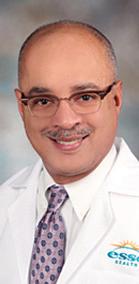
“I have always had a passion for helping underserved
communities.”
By JoAnn Weaver The St. Louis American
For
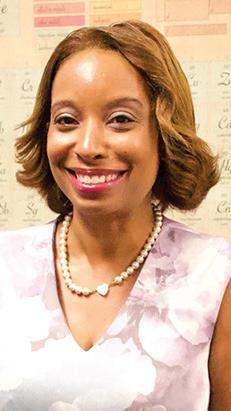
2021 Salute to Healthcare Stellar Performer Dr. Kendra Holmes
“Last
said. “The panel that
out to
NAACP panel with St. Louis County NAACP President John Bowman.”
“St. Louis saw a rise in deaths in the Black community,” Holmes said. The discussion’s main topic was the fact that COVID-19 testing wasn’t readily available in Black communities at the beginning of the pandemic.
“The implications in the rising mortality rate for African Americans is that there were individuals who were unable to be tested in the early stages of the pandemic in the community,” Holmes said.
“This was really a turning point for me when I realized that we, Affinia Healthcare, needed to step up and provide the testing because we weren’t that in North St. Louis and North St. Louis County.”
Affinia Healthcare tested 29,231 people for COVID-19 in North St. Louis County and St. Louis City from March 2020 to July 2021.
“We knew the most vulnerable communities

Storm Reid unveils swimsuit collection with Pacsun for 18th birthday
Actress Storm Reid has released a line of swimsuits with Pacsun in celebration of her 18th birthday.
In an interview with ESSENCE, she said she likes to be different and doesn’t care to follow trends.
“So, I thought, ‘Hmm, what is something that I can put out in the world that will catch people’s eyes?’ I, of course, do everything from a space of authenticity and passion and I’ve just always loved swimsuits.”
Her ArashiBlu Collection is named after a brand she and her mother created in 2019 that is “all about being comfortable with being different.”
“Thankfully I have a pretty good relationship with my body and I know that I was created in a beautiful image. We all were,” she said. “We are perfectly imperfect and there’s just things that we have to accept and embrace.”
The entire ArashiBlu Pacsun Collection is available at www. pacsun.com.

“It’s just really about trying to find or trying to define what beauty is without restriction,” she said. “It’s also about being yourself and having collaboration and community mix together to combat this idea of being perfect.”
Reid hopes her collection inspires women to appreciate themselves.
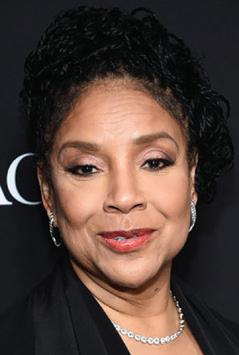
Phylicia Rashad apologizes to Howard for supporting Bill Cosby’s release
Phylicia Rashad, award-winning actress and Howard University’s College of Fine Arts dean, issued an apology to its students and parents after tweeting support of Bill Cosby’s sexual assault conviction being overturned.
In a letter, Rashad, an alumna of the university, wrote, “This week, I tweeted a statement that caused so much hurt in so many people - both broadly and inside the Howard community. I offer my most sincere apology.”
“I am sorry,” Rashad continued. “I intend to earn your trust and your forgiveness. My remarks were in no way directed towards survivors of sexual assault.”
The letter came days after Howard officials
wrote a statement saying Rashad’s tweet “lacked sensitivity towards survivors of sexual assault.”
“Survivors of sexual assault will always be our priority. While Dean Rashad has acknowledged in her followup tweet that victims must be heard and believed, her initial tweet lacked sensitivity towards survivors of sexual assault,” the the Tweet stated.
Tabitha Brown checks
Wendy Williams about husband’s retirement
Wendy Williams’ opinion about Tabitha Brown and her husband Chance’s decision to retire caused the social media sensation to respond.
Brown shared a video last week saying her success has allowed Chance the oppor tunity to retire from the Los Angeles Police Department.
She received favorable commentary about the deci sion from mostly everyone. But not Williams. On an epi sode of The Wendy Williams Show, she compared Brown’s situation to the personal issues she and her ex-husband, Hunter, experienced.
“I predict that this marriage
is going to be on real rocky ground in a moment,” Williams said to the studio audience. “Live your dream. They may invest in stuff and lose the money.”
On July 1, Brown posted an Instagram video addressing Williams directly and let her know that her husband isn’t similar to Hunter.
“Wendy, the pain you must be in to feel this way, honey, I’m so sorry,” she said in the video. “Twenty-three years I’ve been with my husband, broke for a very long time together. Struggled for a very long time together. Succeeded for the last couple of years togeth-











Brown continued that she and her husband agreed for him to take a job to support her dreams. Now, since her career is up and flourishing, she’s okay with him leaving his job to pursue his own dream.
“I was his dog in the fight and he believed in me and we did it together for the last 15 years,” she said.
“I did every year with him in the LAPD and he did every year with me with rejection and nos in this entertainment industry. However, God has blessed. I’ve been praying on this for a very long time and it has now come to pass.”
Sources: People.com, Revolt.TV, Essence.com



By Sophie Hurwitz
The St. Louis American
About 650 students enrolled in Confluence Academy’s ‘Summer Journey’ summerschool program, which is a “significant jump,” compared to 2019 according to Confluence Academies CEO Candice CarterOliver.
The program, run by Catapult Learning, contracts with districts and school systems across the state.
About 33,000 students are enrolling in Catapult’s summer programs in Missouri this year.
“One of the things I really noticed was the laughter in the building,” Confluence Academy Old North Principal Leslie Muhammad said.
“We’ve had more students coming back during Summer Journey than we had at the beginning of the pandemic. Just hearing the laughter in the building, because they really enjoy the engagement.”
Confluence Academies have offered elementary school students the option to return to inperson learning since October 2020, and middle and high
school students have had the option since January 2021.
This Summer Journey program, however, is the first fully-in-person program the school has offered since the pandemic. Catapult provides lesson plans, and advertisement and professional development materials for teachers running the summer programs.
“The glossy folders make a difference!,” said Suzanne DeZego of Catapult.
This is the 20th year that Catapult’s Summer Journey programs have been operating in Missouri. They include more standard classroom work in the mornings, as well as more unique courses in the afternoon. At Confluence Academy, for example, all students were given swimming lessons in order to learn valuable safety skills and cool off in the midsummer heat.
“Having the opportunity to go swimming this summer was very exciting, especially with the high number of African American children who don’t know how to swim,” Muhammad said. She also highlighted the
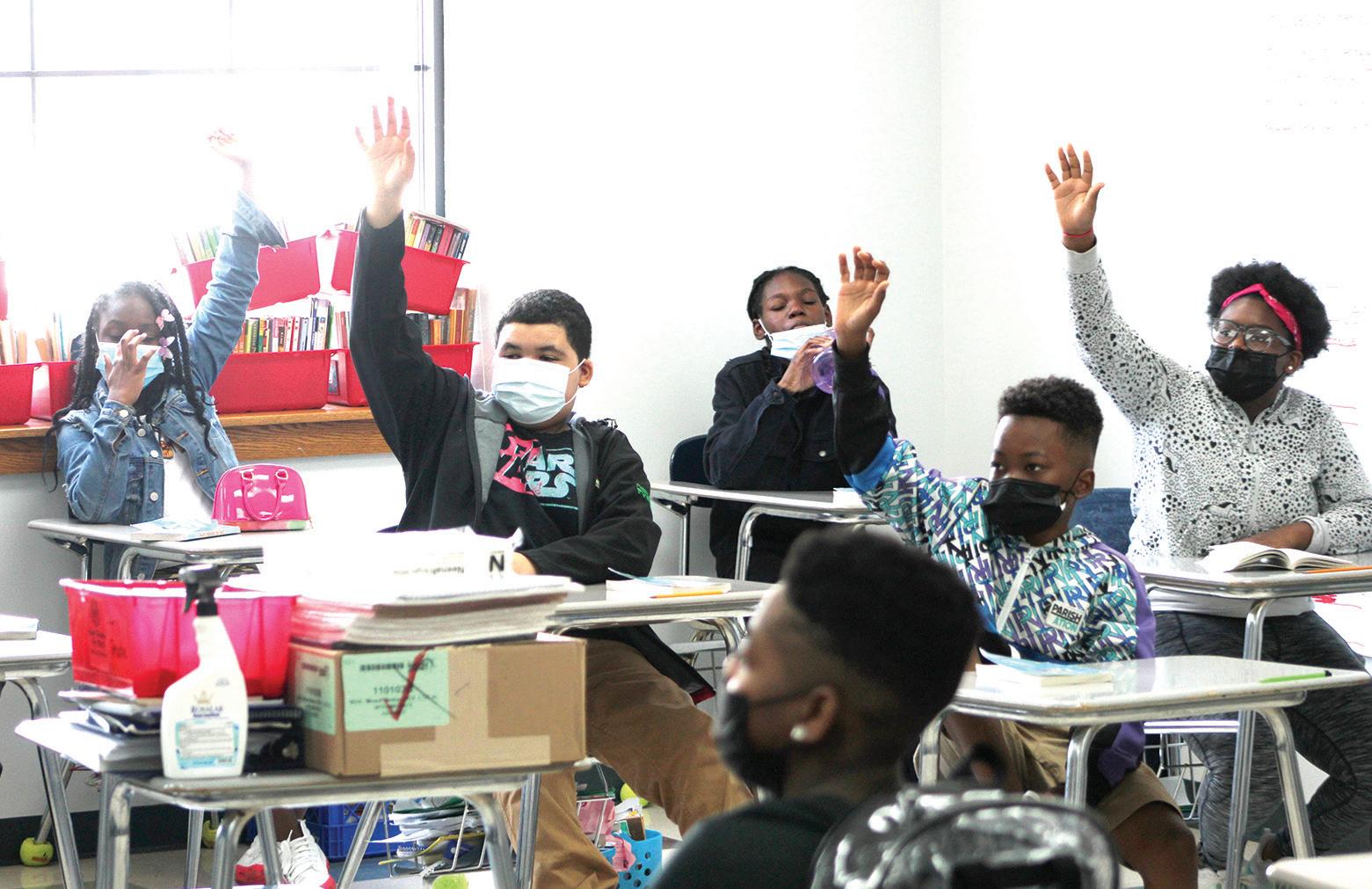
important the schoolhouse is, and wanted their kids back in it.”
These patterns of enthusiastic return to in-person summer school continue throughout Missouri, DeZego said, where more students are enrolled in Summer Journey programs than in previous years.
“Overall, we have better attendance rates this year than we’ve had, and I think that’s because families are ready for that in-person schooling, and kids are ready for that social piece.”
“Engaging children during the summer months is critical, particularly for urban students,” Carter-Oliver noted. “We have families that rely on the school setting for care, for breakfast and lunch, for supervision, and all of those social and emotional types of support. And we want to be able to be a space to provide that. So summer learning, for us, is just essential.”
drone operation classes the students engaged in, which were particularly relevant given the school’s proximity to the new NGA development. The programs, which emphasize hands-on activities like cooking and art, were not offered in many of the districts Catapult ordinarily works with last year. This year, though, as Carter-Oliver put it, summer school is more important than
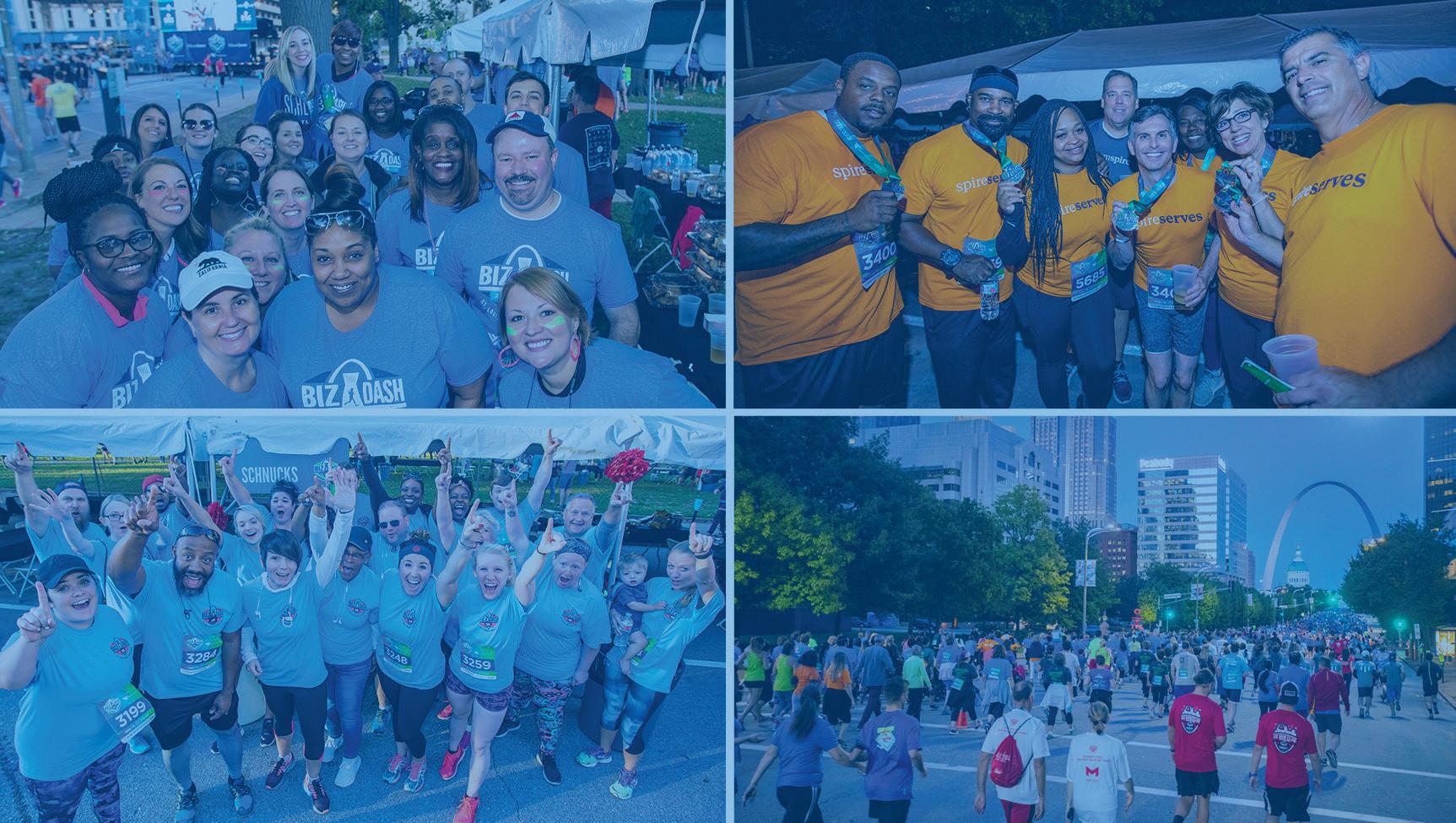
ever—especially since many students have been falling behind on state learning standards after a year of online or hybrid learning.
“In the fall, we’ll return in-person fully, and we believe just having that past year of experience and then an in-person summer-school experience has all just kind of built up to that,” Carter-Oliver said.
And the Summer Journey
program also took a weight off the overburdened shoulders of Confluence Academies’ parents.
“Families wanted their children back in school, back in a physical space amongst other children. We’ve asked parents over the past year to be that person at home helping navigate that, and some parents have really seen the challenge in that. I think parents saw how
Catapult offers remedial math and reading work to help students who may have fallen behind or been unable to complete their work during the standard school year. DeZego said that eight districts across the state are using those programs, as opposed to “about 5” in more standard years. Those programs, Achieve Math and Achieve Reading, “really drill into those skills that were missed. So, not just reteaching the same thing—it’s what skills did they miss and let’s go back to that. So we’ll look at what those skills are, where the holes in the learning are, and teach those skills to help kids advance.”

Now that the Fourth of July is over, and we have all been reminded of what Frederick Douglass said and did, the cookouts are behind us. But so is the memory of white nationalists marching in the streets of Philadelphia with flags and faces covered.
Let us now come off recess and dig in for the battle ahead. Let us not be like the ‘Summer Patriot and Sunshine Soldier’ that Thomas Payne wrote about during the Revolutionary War. In his publication, “The Crisis”, he said that such would soon vanish from the battle, but those that endured until the end would desire the love of all mankind.
The question on so many of our minds is “how do we fight and when and where do we fight?” The answer: Right where you stand, and right now. You fight right where you stand by moving beyond waiting for someone to tell you what to do. Look at what needs to be done and start doing it.
For example, there is a gubernatorial recall election in California in less than 60 days. Democratic Gov. Gavin Newsom may not be the best Governor, according to some, but he is better than the alternatives of Kevin Faulconer, John Cox and Caitlyn Jenner. We have already seen what Republican governors have done in Missouri and the rest of the country with voter suppression and support of Trump’s Big Lie. If a Republican is on a ballot, then we must act to vote against them and what they represent. Democrats are not our answer, but they are better than the alternative.
Since the United States Supreme Court has finished gutting the Voting Rights Act and the U.S. Senate refuses to act in allowing America’s Constitutional form of government to work, then we must mobilize in every state where there is a Republican on the ballot for Governor, U.S.
Senate, or House of Representative; to find and support those people running against them and back voting rights, who will work to kill the Filibuster in the U.S. Senate.
The reality is that there are more of ‘us’ than ‘them,’ but they have learned that historically Blacks have not voted in the same percentages as whites. We must repeat the voter turnout of the 2020 election, despite the new voter suppression laws and efforts to purge election rolls. We must start now to re-register people to vote, join the Black Votes Matter (BVM) movement in every state where we live or have family.
Just as our forefathers didn’t quit the fight for civil rights and equality because of the KKK or the hatred of segregationists, so we must not be deterred by marching white nationalists, no matter how they are armed and dressed. We must neither ignore nor be discouraged by racist white state governors doing everything in their power to make sure we don’t vote again in the numbers we produced in 2020.
We must not become apathetic if we live in Illinois or another blue state. We have already seen the plans to use the results of the 2020 Census to change electoral districts, drawing new boundaries that weaken the power of our collective vote.
When we decide to fight, one person at a time, regardless of where we live, we give new meaning to the saying, “There is no power like that of an idea whose time has come.” Our time has come, but only if you get involved. If you don’t know what to do, then ask somebody. Get armed with information and then get active where you stand.
This editorial is from the July 7 edition of The Dallas Weekly
The Barbershop: So, we’re gonna get into the why of voter suppression in 2021.
Socrates: To understand what’s going on with voter suppression today, you must look back in history to see how America has changed demographically. It was the historic demographic makeup that allowed America to maintain its political fiction of democracy while running an apartheid social system, aka Jim Crow.
Black voter suppression is a result of two mutually reinforced dynamics in white America. The first is socio/ economic, which maintained America’s racial caste structure. The second is literally maintaining the white political hegemony.
Let’s start with the caste structure. Everything white America did to us from 1877 to the 1950s had to do with maintaining the racial caste structure that replaced slavery.
Denying Black people the vote after Reconstruction had more to do with denying us the ultimate symbol of citizenship and equality than anything else. During this period, Black political involvement would have never threatened white political dominance. Blacks were never more than 12% percent of the population.
The Barbershop: I understand we represented a substantial percentage of the population in Southern states. But we voted with northern Republican interests. Why weren’t they more active in supporting our political interests.
Socrates: The Compromise of 1877. Southern white Democrats supported Republican Rutherford B. Hayes, in exchange for Republicans pulling federal troops out of the South. This was Reconstruction’s end.
The Barbershop: Yeah, almost 100 years of white racial terrorism, lynching, white mobs assaulting and destroying Black communities all over the country. But I can never understand why?
Socrates: Our progress in building community, beginning one generation removed from slavery and continuing into
the 20th century posed a serious threat to the idea of white supremacy. A threat to white supremacy anywhere becomes a threat to white supremacy everywhere.
The Barbershop: Is this where we’re supposed to ask, ‘what changed Socrates?’
Socrates: The short answer is the Voting Rights Act and the Immigration and Naturalization Act. Both happened in 1965. Together, they explain why white right-wing Republicans are locked in on Black voter suppression and anti-immigration laws in 2021.

The Barbershop: We know about Voting Rights Act stopped Southern states (the Confederacy) from changing voting procedures unless they were pre-cleared by the Justice Department. DOJ. Help us with how the Immigration Act comes into play. Socrates: The Immigration and Naturalization Act removed racial quotas on immigration. From the late 1800s until 1965, basically no one from Africa, Asia, South America or the Caribbean could legally immigrate to the United States. Here’s what the 2020 Census will probably conclude. NonHispanic whites will still be most of the population. But they now will only make up 59.7% of the U.S. population. The non-white Hispanic population will constitute 18.5%, the Black population 13.4% and Asians will comprise 5.6%. A deeper look into the numbers will explain reactionary white racist panic. In 2020, most people under 18 were People of Color (POC). By 2027, POC will be the majority in the age cohort from 18-29. By 2033, most people from 30-39 will be POC.
Another way to look at it, in a little more than 10 years, most Americans under 40 will be POC.
It is way past
The younger America gets, the less white it will become. America’s demographic destiny is sealed. This will soon become a majority non-white country.
The Barbershop: They’re doing voter suppression because it’s the only they can maintain political control.
Socrates: They’re doing much more than voter suppression; they’re proposing legislation that will make it possible for Republican controlled legislatures to change the outcomes of elections on little more than a white whim. They’re not just suppressing Black voter turnout, but also negating the votes of Black people.
Socrates: Guess what two states have the largest Black populations? Texas and Florida. Texas also has the largest Hispanic population.
Along with Arizona and Georgia, wanna guess what two states are leading the charge with the most aggressive proposed voter suppression laws?
The Barbershop: Let me guess, Texas and Florida!
Socrates: You got it!
The Barbershop: I get why they are coming so hard, for white nationalist America, aka the Republican Party, this is a ride or die political moment. What really scares the hell out of me though, is 75 million people voted for Trump.
Socrates: Yeah, that’s a whole lot of angry, scared, emotionally unhinged white people looking for somebody to blame for their troubles, and there appears to be no limit to what they’re prepared to do.
The Barbershop: Socrates, how you deal with that kinda….., you know?
Socrates: Because they’ve been doing white supremacy lines since 1619, they’re too high to reason with, too coked up to quit. You’re gonna have to beat them, no quarter given, none asked.
The Barbershop: Are we up for that?
Socrates: Let me take this call, and then I’ll answer your very legit question.
To be continued
By Marc H. Morial
“Congress has both the moral obligation and the constitutional authority to pass the D.C. statehood bill. This country was founded on the principles of no taxation without representation and consent of the governed, but D.C. residents are taxed without representation and cannot consent to the laws under which they, as American citizens, must live.” – Eleanor Holmes Norton, Delegate to United States House of Representatives representing the District of Columbia
Earlier this week, I had the honor of testifying to the Senate Committee on Homeland Security & Governmental Affairs in support of Statehood for the District of Columbia.
While in law school in Washington, D.C., I grew to love the community and made the city my second home. As a member of the D.C. Statehood Commission from 2006 to 2010, I advocated for D.C. statehood.
As the former Mayor of New Orleans, I have deep experience in running a busy and thriving city with a diverse population. Residents of these cities, like Americans across the country, must have representation in Congress to meet their needs and protect their rights. Yet the citizens of the District of Columbia continue to be denied this representation and are relegated to second-class citizenship.
The international community agrees. The United Nations Human Rights Committee, Organization of American States, and Organization for Security and Cooperation in Europe all have recognized the injustice of D.C.’s status.
Nearly 700,000 Americans live in the District of Columbia and suffer under the daily injustice of “Taxation without Representation.” They pay the highest per capita federal income taxes in the country, serve on juries, and fight and die in wars, yet they are denied full democratic
rights. They are unable to bring grievances to influential federal officials, reap the benefits available to other congressional constituents, or have a say in the important issues of war and peace that confront this nation.
As a civil rights and human services organization, the National Urban League is in a unique position to see how this lack of representation directly impacts the populations we serve – most extremely over the past year. Black and brown communities suffered higher rates of infections, deaths, and unemployment due to Covid-19. Racial inequities in education, housing, employment, health care, and household wealth are worse than they were before the pandemic struck. Nowhere is this tragedy more evident than in the District of Columbia.
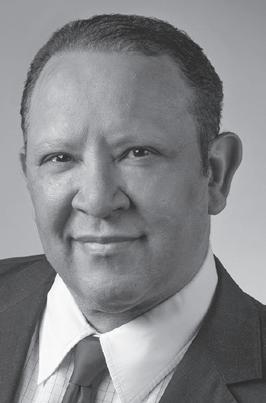
Marc H. Morial
D.C. residents, including essential workers and small business owners, were in dire need of the relief afforded under the CARES Act. Unlike other citizens, they did not have congressional input into the CARES Act, and they initially were denied $755 million in critical direct relief.
Last summer, D.C. residents took to the streets in peaceful protest of racially-motivated police violence. In response to this peaceful uprising, the previous administration ordered both the National Guard and federal law enforcement to carry out a wildly disproportionate and inappropriate response, all in the interest of a photo op.
On January 6 -- despite the urgent requests of D.C. Mayor Bowser -- that same administration refused to call in the National Guard in response to a violent attack on the U.S. Capi-
Transit riders can play role in combating human trafficking
The occurrence of human trafficking is pervasive throughout the United States – and in Missouri. In fact, the state has the eighth highest human trafficking rate in the nation according to the World Population Review. This is due, in part, to direct connectivity to eight other states and access to robust public transportation systems, where traffickers often recruit and transport victims.
Educating ourselves on the intersections of this issue can help transit providers, and all who access public transit systems, play a key role in proactively and productively combating this horrific reality.
Identifying victims, traffickers and buyers isn’t easy. All are said to include people of varying ages, sexes, races and socio-economic statuses. But there are red flags to look for when
tol until much of the damage had already been done. In both of these cases, D.C. officials were unable to respond effectively to urgent emergencies in their city because the District lacks statehood and the critical safety mechanisms it provides.
Despite all these events that directly impacted and harmed them, D.C. residents are not able to hold elected representatives accountable for these harms. They are not represented by a Congress member who can vote to establish a Commission to investigate the Capitol insurrection, or to reimagine public safety through the George Floyd Justice in Policing Act. I am grateful to Senator Tom Carper of Delaware for calling national attention to the secondclass status of the citizens of the District of Columbia by introducing the Washington, D.C. Admission Act in the Senate.
I also applaud the longstanding and strong leadership on this issue by D.C. Congresswoman Eleanor Holmes Norton who authored the first statehood bill in 1991 upon first arriving in Congress and who has remained a steady soldier in the fight for equality for the District’s citizens.
Black Americans have bled and died for the right to vote in this country for centuries. The Supreme Court’s decision in the landmark case Wesberry v. Sanders says it best: “No right is more precious in a free country than that of having a voice in the election of those who make the laws under which, as good citizens, we must live. Other rights, even the most basic, are illusory if the right to vote is undermined.” We cannot allow this denial of constitutional rights to continue right outside of Congress’s front door. The goals of our civil rights movement will not be realized until D.C. statehood is achieved.
Marc H. Morial is president and CEO of the National Urban League.
traveling via transit. Victims often exhibit signs of distress in their eyes and posture, are nonverbal or not allowed to speak for themselves, avoid eye contact, appear helpless, dress in clothing that isn’t age appropriate, appear addicted to drugs or are traveling alongside older individuals who seem to be mismatched. Traffickers may hang out at transit stops but never utilize transit or stay on a bus or train for long periods of time without deboarding. Homes along bus routes with a lot of in-and-out traffic or people going to hotels without luggage are also concerning. If you suspect someone is involved in human trafficking do not approach them. Call the National Human Trafficking Hotline at 1-888373-7888 or text “Help” or “Info” to 233733. To learn, more visit www.thecoveringhouse.org.

Peyton Moore, 4, embodied the spirit of International Mud Day during a June 29 celebration at the University City Children’s Center. Children throughout the world are encouraged to experience the joy of playing with, and in, mud annually on this day.
The mud play is fun and educational because it can enhance use of motor, social, cognitive and creative skills. The UCCC was founded in 1970 as a place for children from different socioeconomic, ethnic, racial and cultural backgrounds to learn and play together. UCCC serves nearly 200 children and families who live in more than 30 zip codes in the St. Louis region.

St. Louis American Staff
Food insecurity issues cannot be shelved because fewer COVID-19 cases are being reported. They remain a problem for families throughout the St. Louis area and state. Nearly one in six Missouri residents lacks reliable access to healthy food.
SSM Health DePaul Hospital and the St. Louis Area Foodbank have partnered to reduce food insecurity in North St. Louis County through the Food is Medicine program. The “Feeding America” initiative is funded by the Anthem Foundation and the foodbank recently received a $65,000 grant.
Respective hospital staffs will screen patients for food insecurity. If a need is identified, patients will receive enough food for several meals for themselves and their household when they are discharged. They will be connected with the foodbank for additional food, nutrition education and valuable community resources. This includes assistance with applying to the Supplemental Nutrition Assistance Program.
“Food insecurity is a significant health care con-
cern in our community,” SSM Health DePaul Hospital
President Tina Garrison said.
“Partnering with these organizations to try to meet even a portion of the food security needs is the first step in meeting the full health care needs in this area.”
Meredith Knopp, president and CEO of the St. Louis Area Foodbank, said the partnership is instrumental “in helping break cycles of food insecurity right here in our backyard.”
“The generous investment from Anthem will help us truly transform lives to ensure fewer people go to bed hungry, and more people are living healthier, longer lives.”
In June, SSM Health DePaul Hospital and St. Louis Area Foodbank joined with Operation Food Search to host a food distribution event at the DePaul Hospital campus. The event provided food to over 160 families.
There will be a grand opening event for the food pantry this summer, and the grant is part of a $1 million gift made by the Anthem Foundation to Feeding America.

By Nina Turner / NNPA
For decades, the Black press has been a vanguard of the Black community’s history and guardian of its future. As we sit at a crossroad of progress and regression, hope lies in strengthening this storied institution.
The challenges facing our community are serious. In multiple states there are attempts to roll back access to the ballot. In many communities, Black and poor people live under the daily threat of gun violence. Black people and other marginalized groups continue fighting for high quality education.
Educators are being told that they cannot discuss this nation’s complicated history with race and racism, as bans are enacted on Critical Race Theory discussion.
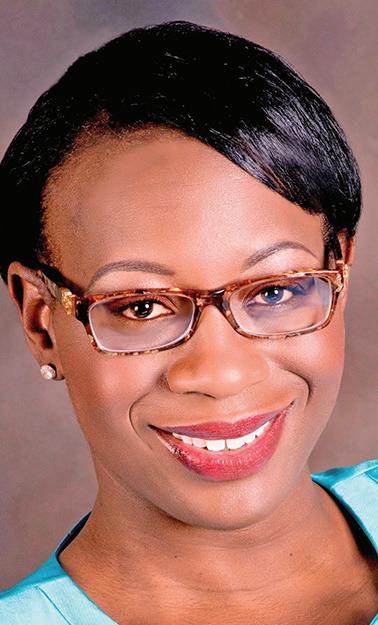
The hope for our future lies, in part, on a thriving Black press.
For too long Black communities, and other marginalized groups, have suffered when the people who tell their stories do not look like them.
In seeking to understand the origins of riots in the summer of 1967, the Kerner Commission found that a lack of diversity in the news media was a contributing factor. The Commission was formed at the behest of President Lyndon Baines Johnson and tasked with uncovering the roots of the riots.
It found that Black people were not being hired by media outlets in numbers proportionate to their population. Many people felt the lens through which the media told and interpreted Black community stories was inherently racist.
The commission stated that America was moving toward “two societies, one white; another one Black.” The group recommended that policymakers “mount programs on a scale equal to the dimension of the problems, including closing the gap between promise and performance.”
And while the Kerner Commission outlined ways to improve media coverage of Black communities, Black journalists and publishers have long shared the need to have communities of color behind and in front of the camera.
Long before the Kerner Commission report, the Black community knew and understood that the Black press was vital to fair representation and balanced coverage. It wasn’t just that the Black press traced the arcs of our and our ancestors’ lives, but it was also a place where both our struggle and triumph was chronicled. It was also a home for Black journalists committed to reporting the news and providing historical context. From Freedom’s Journal to Ida B. Wells-Barnett’s Memphis Free Speech, Black journalists and publishers opposed slavery, lynching and the inhumane treatment of Black people.
The Chicago Defender chronicled the great migration of southern Blacks to northern cities. In search of “warmer suns” as author and journalist Isabel Wilkerson noted, Black people moved north, bringing with them their wounds, talents, and hopes for brighter days. The great migration, then, is a lens through which we can understand modern immigration struggles.
When white publications refused to print obituaries of Black people, the Black press was a dutiful companion. When white publications minimized or ignored our accomplishments and career highlights, our community not only created but sustained publications including EBONY and JET magazines.
When mainstream media largely ignores the Black community, or positions us in an unfavorable light, the Black press is a lighthouse that illuminates our paths. I honor not only Black journalists but the associations that have served them. The National Newspaper Publishers Association and the National Association of Black Journalists are leaders in support of Black journalists and Black newspaper publishers.
The victories our ancestors won decades ago are under legal assault. We cannot meet this moment without a strong Black press. As we think about what is needed for our communities to succeed, we cannot overstate the importance of investing in Black media. The investments include infusions of capital, giving Black press first rights of refusal when it comes to breaking news and supporting Black journalists. Nina Hudson Turner is an educator and former Ohio state senator
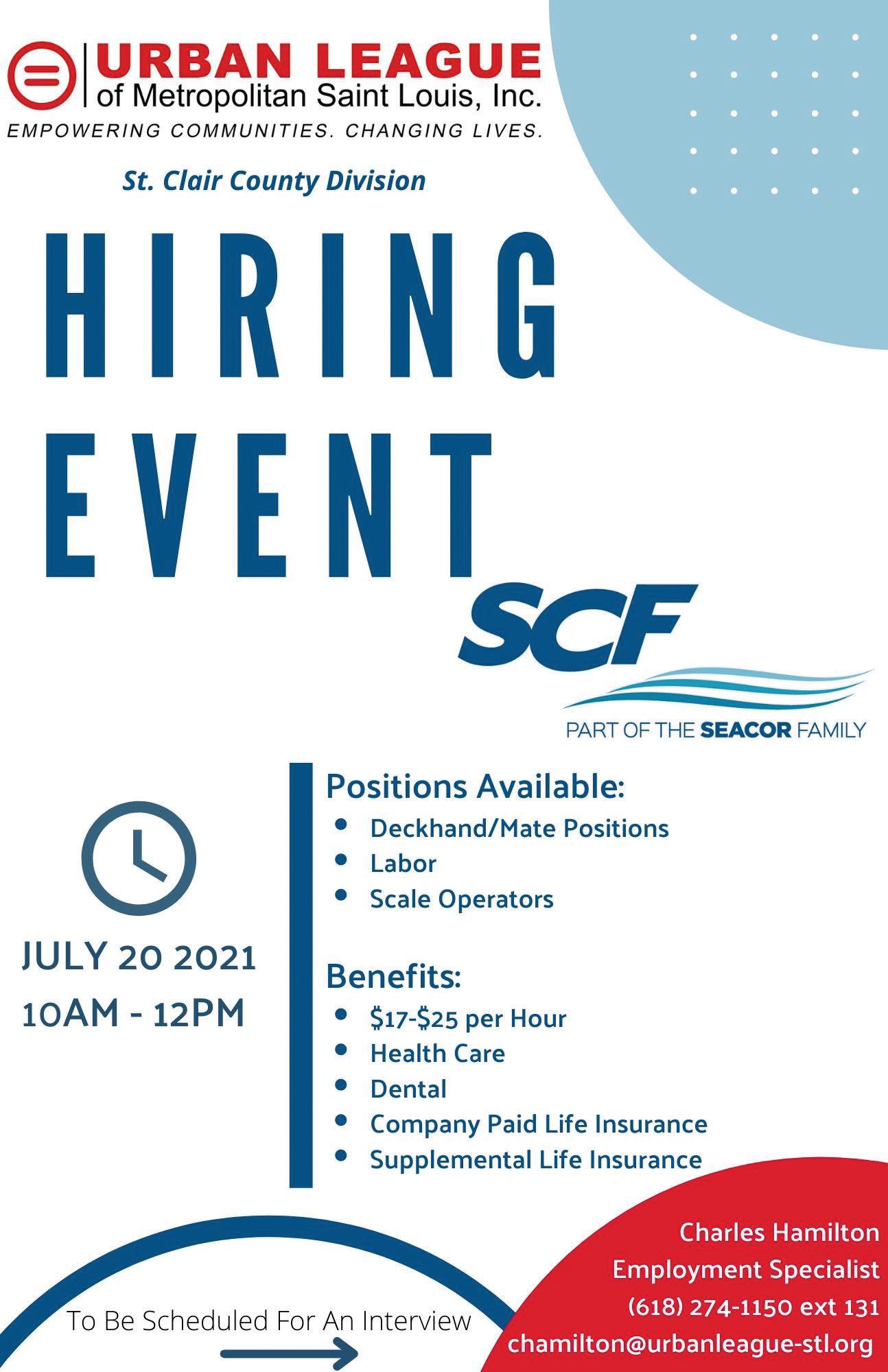
Continued from A1
who would suffer the most,” Holmes said. “The infection rates and the mortality rate were the highest in the black communities in St. Louis.”
Affinia Healthcare has served St. Louis since 1906. Its mission is to provide high-quality healthcare while promoting healthy lifestyles. The pandemic kicked the presence of the community healthcare center into high gear in 2020.
“It was a missed opportunity for us to not have testing immediately available for the communities that would be impacted the most by the virus,” Holmes said. “This is why we really stepped up at Affinia Healthcare because we have always been in the community.”
Holmes has recently switched gears to focus on the vaccination rate and increase the number of vaccines distributed in Black communities in St. Louis.
“I am very concerned with the Delta variant that is emerging in the nation,” Holmes said. “It will hit areas, like the Black community, hard because we aren’t getting vaccinated.”
The Delta variant of COVID-19 is emerging in Missouri, which has one of the highest infection rates for the virus in the nation. Holmes expounded on why people are suspicious of the vaccine.
“The reason for hesitancy around the vaccine is because there is a deep distrust in our community regarding healthcare from a historical standpoint,” Holmes said.
The main tools health organizations have been using to ease fears surrounding the COVID-19 vaccines have been education and building trust in local communities.
“As a health care professional, I stress the importance of the vaccine to safeguard us from COVID-19, especially the Delta variant which has shown itself to be more aggressive,” Holmes said.
“In order to make this happen, we have to build trust within our communities so people can see the vaccine will help not do harm.”
The community healthcare center offered COVID-19 testing events, which built trust in different parts of St. Louis. So far, Affinia Healthcare has administered 16,250 vaccinations to city and county resi-
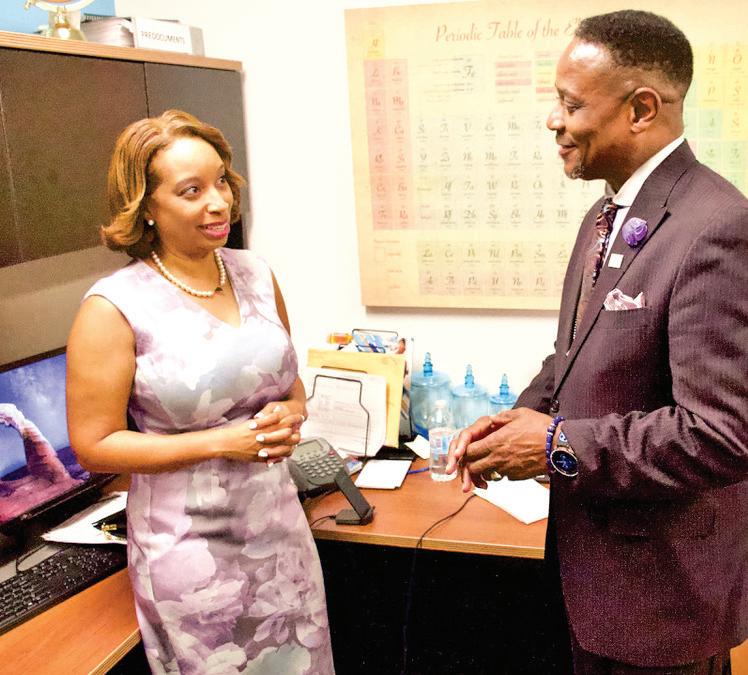
dents. Additionally, Holmes leads the Diversion and Treatment Initiatives as a part of St. Louis County Prosecutor Wesley Bell’s Prosecutor-Led Diversion Program. “What really connected me to the mission of the program is that I was working at a community health center, where I coordinated medication reports for the St. Louis City and St. Louis County jails for individuals who are incarcerated who are actually my patients,” Holmes said.
Holmes has been a pharmacist for 20 years and has seen hundreds of patients. With her civic-minded career goals, joining the Prosecutor-Led Diversion team made sense to get more resources to where they were needed: people who were on the edge of entering the criminal justice system.
The diversion program is for low level, non-violent offenders who have behavioral health or substance abuse disorders. It gives them the resources they need to keep them out of the criminal justice system. The

program has seen 1,154 individuals who meet the diversion program qualifications who have either successfully gone through it or are in progress to date.
The St. Louis native has worked with Prosecutor Bell’s diversion team for two years, but her reason for why she works with the team is personal.
“This is an issue that disproportionately affects Black men; I have a Black son,” Holmes said. “This is personal to me in the sense that I care about our community. I, along with the projects I am a part of and partners I work with, am trying to give Black people, specifically black men, the opportunity to
succeed.”
When asked why she chose to work for Affinia Healthcare, which was originally called Grace Hill Health Centers, Holmes talked about her motivations for being in the healthcare industry.
“I have always had a passion for helping underserved communities,” Holmes said.
In 2003, Holmes started her career at Affinia Healthcare as a staff pharmacist. Within two years, she was promoted to director of pharmacy services. Holmes was promoted to director of pharmacy and radiology services in 2012. Two years later, she was again promoted to vice president of clinical integration and ancillary ser-
vices. In July 2015, she was named vice president/COO.
“As a St. Louis native who has seen firsthand the disparity that exists as far as health, education, employment, economic and health opportunity in St. Louis for African Americans, I decided not to take the highest paying job, but I took the most rewarding job, which was working at a community health center.”
The St. Louis American Foundation’s 21st Annual Salute to Excellence in Health Care Awards will be celebrated as a free virtual event at 7 p.m. Thursday, July 29. For additional details and registration, please visit givebutter. com/2021HealthSalute
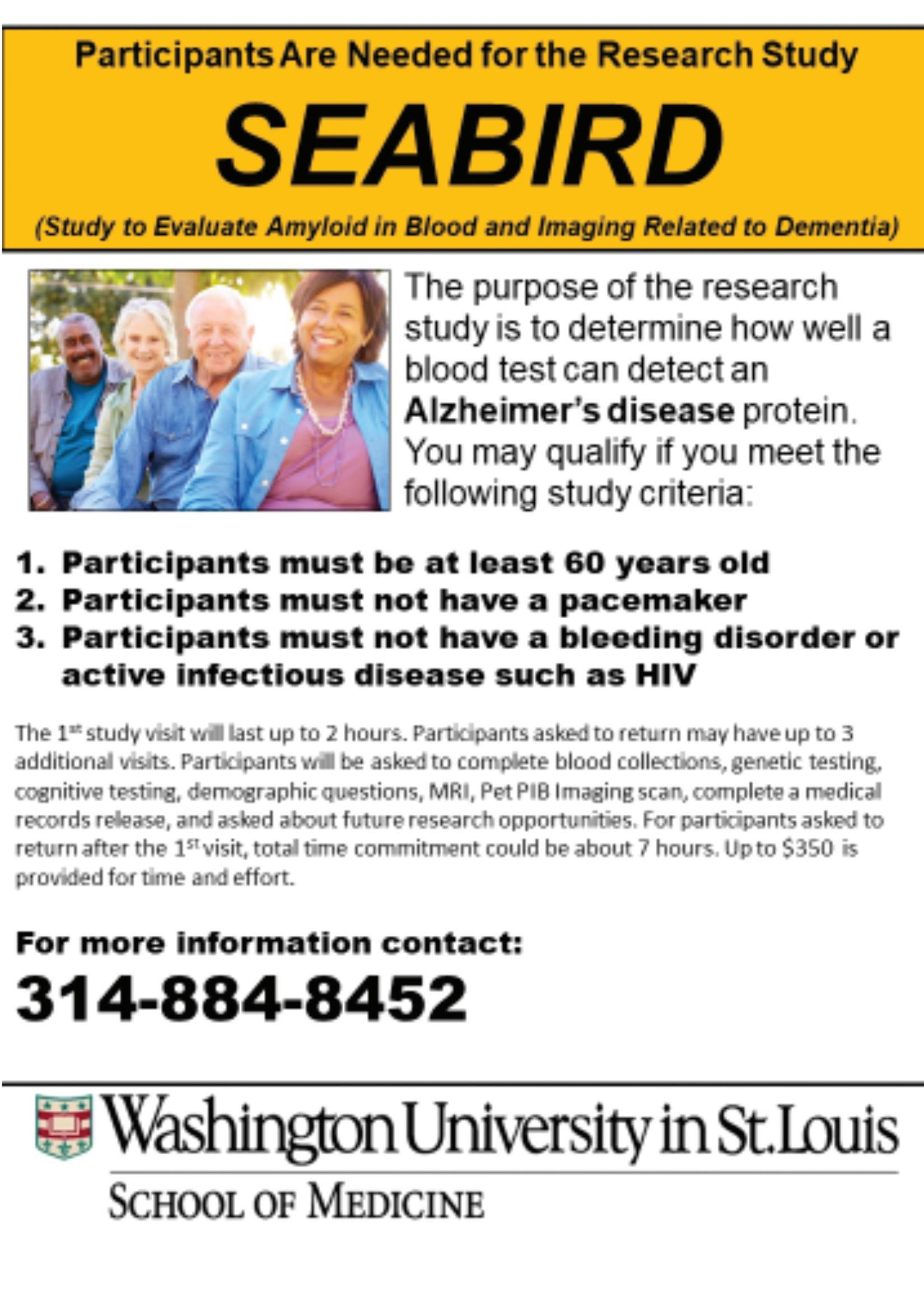
Continued from A1
a vehicle to improve the lives of African Americans in the city and county. I am in awe of what the publisher and the paper has been able to do all these years in our community.”
Williams’ retirement and recognition comes amid a global pandemic that highlighted the discrepancies and deficiencies of healthcare in communities of color. He realizes the important role that private practices like his, located in the heart of a low-income community, have in serving marginalized communities.
For example, he shared his concern about African Americans who are still hesitant to get vaccinated against COVID-19. Williams has been able to convince many of his long-time patients to get inoculated. The key to their conversion, he stressed, were intimate conversations with a practitioner his patients trust.
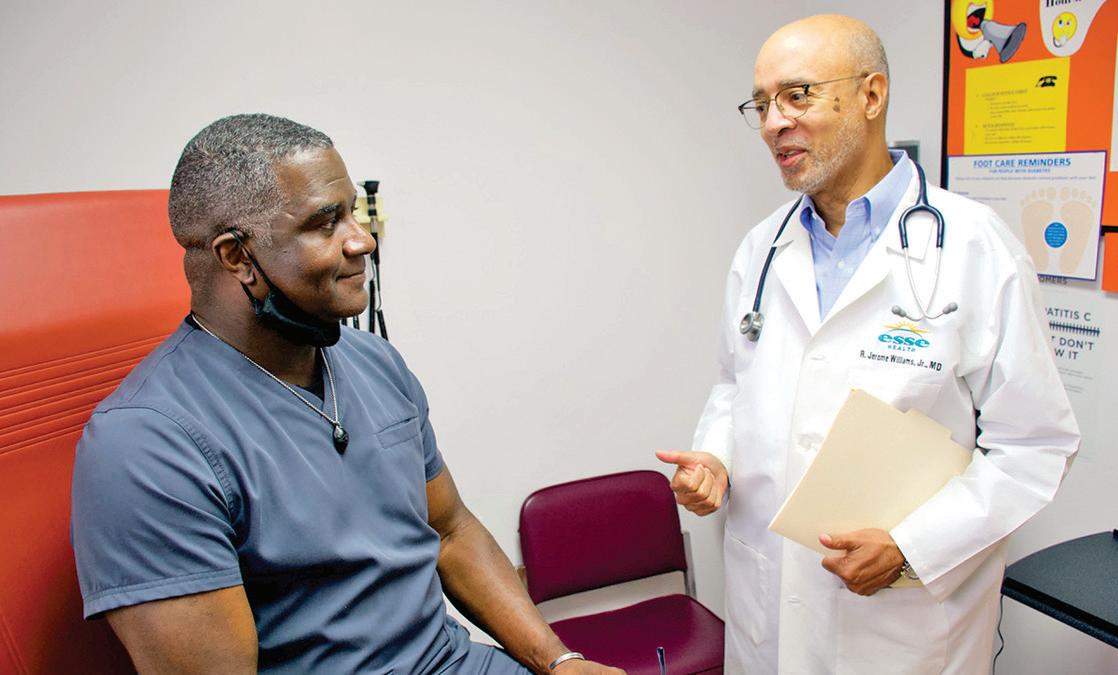
“When you’re one on one, the most important thing to do is listen to the patient and find out what is most important to them. It may be their grandson’s graduation, their daughter’s wedding or maybe their grandchildren. When you listen, you find out what’s most important to them, and help them select what will benefit them personally. But, it’s those face-to-face conversations, not just lecturing them,” he said. Williams doesn’t believe the coronavirus will ever disappear. Infection rates “will most likely go to its lowest level where it’s not affecting hundreds of thousands of people,” he said. But the virus, with its various mutations, will probably remain.
Continued from A1
County. And there’s only one person I know of who could take the lead and get that done.
Thank God for Hazel Erby.”
Erby is survived by her husband and high school sweetheart Louis, three children and a host of grandchildren. According to her mentee, Terry Wilson, she was also a “grandmother” to many younger people in politics.
“She made you feel like she was a part of the family once you got into her circle,” Wilson said. “She was always that grandma to us young folks. It wasn’t just political with her, she got close to you personally.”
Councilwoman Rita Heard
Days also described Erby as her council mentor, as well as a trailblazer and a humanitarian. She was someone who told others she loved them frequently and without restraint,
something illustrated in a tweet by St. Louis County Prosecutor Wesley Bell, which stated the last exchange between the two politicians was a text reading “love you.” Erby passed away after a years-long battle with pancreatic cancer.
“She still kept it moving,” Wilson said of Erby during her treatment. “She didn’t want anybody to feel sorry for her … she wanted us to continue to do what we were doing, and she was going to continue to do what she was doing, and continue to hold people accountable while she was going through all this.”
She remained active in politics even after her condition worsened.
Wilson said being an advocate for others may have been what gave Erby the strength to keep going and stay involved in her community to the very end.
In particular, she remained involved in University City politics, as U. City Mayor Terry Crow said: “In addi-
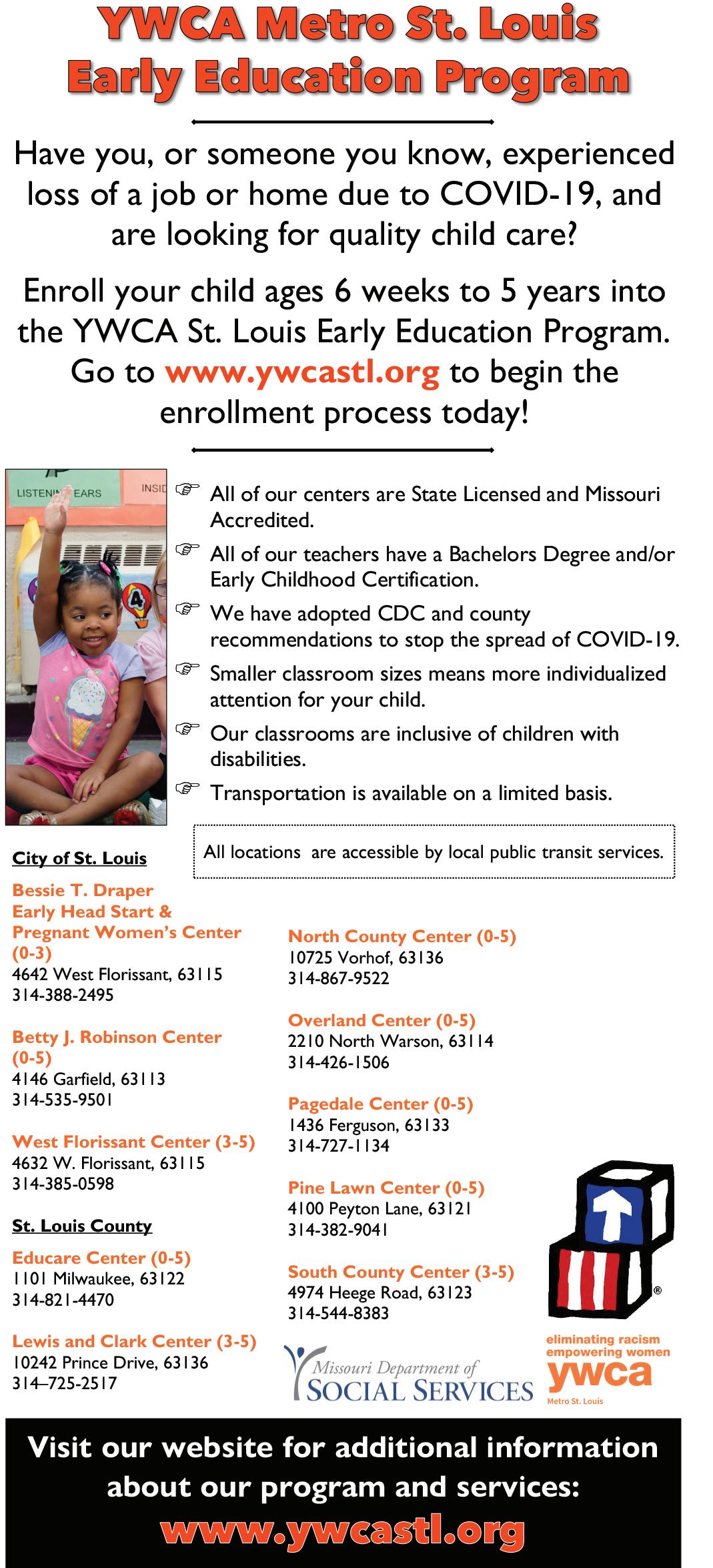
He hopes the virus has inspired medical institutions like Washington University and St. Louis University to do more in addressing inadequate health care afforded to the poor.
“I’m just hoping that once we work our way out of this pandemic through herd immu-
tion to raising her family in
University City, serving on the University City School District Board of Education and as a member of the City Council, she was a genuinely kind, considerate and compassionate friend and neighbor to all who knew her.”
Wilson suggested that Erby’s desire to serve her community is what kept her fighting even throughout her treatments.
“This was in her, this was what she did,” he said. “I think
nity and vaccinations that people don’t forget about these discrepancies and disparities and continue to work to make those changes.”
Williams is pleased that his practice will live on after his retirement. He spent two years finding physicians he felt could carry on his family’s tradition.
this is probably what kept her around as long as it did … it kept her going, that fight.”
Jennings Mayor Yolanda Austin said that Erby leaves a powerful legacy of service.
“Whenever things were available for the community, she always shared with them,” Austin said. “She was always a fighter for the people. Whenever I’d ask any help from her for our community, she’s always been there.”
And some of her legacy has yet to be executed, such as the
Most, he said, didn’t fit the criteria he sought, which included a desire to make the practice their number one priority.
He’s very pleased, however, with the two physicians, Dr. Aunita M. Hill-Jones and Dr. Larry Cayce Buck II, he’s hired to take his place.
“I feel very strongly that
community center she pushed for in North County that still needs to be constructed, as well as an ongoing lawsuit against Page, in which she alleged discrimination in her firing as director of diversity and inclusion.
“[Page] promised her that if she took that position, she would help make all of St. Louis County government fair and equitable, and that he would support her 100% in doing that. He promised her that, he promised me that. And
they are committed to providing good medical care,” Williams said. “Their credentials are unparalleled, their interactions with the patients are top-notch, and they’re driven by excellence.”
Williams is looking forward to the life of a retired physician. With three grandkids and another on the way, he plans to take a little time to do for himself by eating better, exercising, and traveling to see his grandchildren.
Williams said he eagerly awaits turning off his alarm clock and not rising every morning to practice medicine. With many pressing social and political issues on the horizon, he also will choose the topics he’s most passionate about and address them through lectures, seminars and other forms of public outreach.
“I’m accepting this award for the Williams Family and the tradition of providing medical care for the community.”
Sylvester Brown Jr. is The St. Louis American’s inaugural Deaconess Fellow. The St. Louis American Foundation’s 21st Annual Salute to Excellence in Health Care Awards will be celebrated as a free virtual event at 7 p.m. Thursday, July 29. For additional details and registration, please visit givebutter. com/2021HealthSalute
he didn’t keep his word,” Pruitt said. So, in order to honor her legacy, Pruitt said, the fight towards greater equity in St. Louis County will continue. “To make sure that minority inclusion, as the intent of the legislation, happens to its fullest … that’s what she wanted … that’s all it was about. Creating gifts that keep on giving. And those are two gifts that can keep on giving, whether Hazel is here or not.”

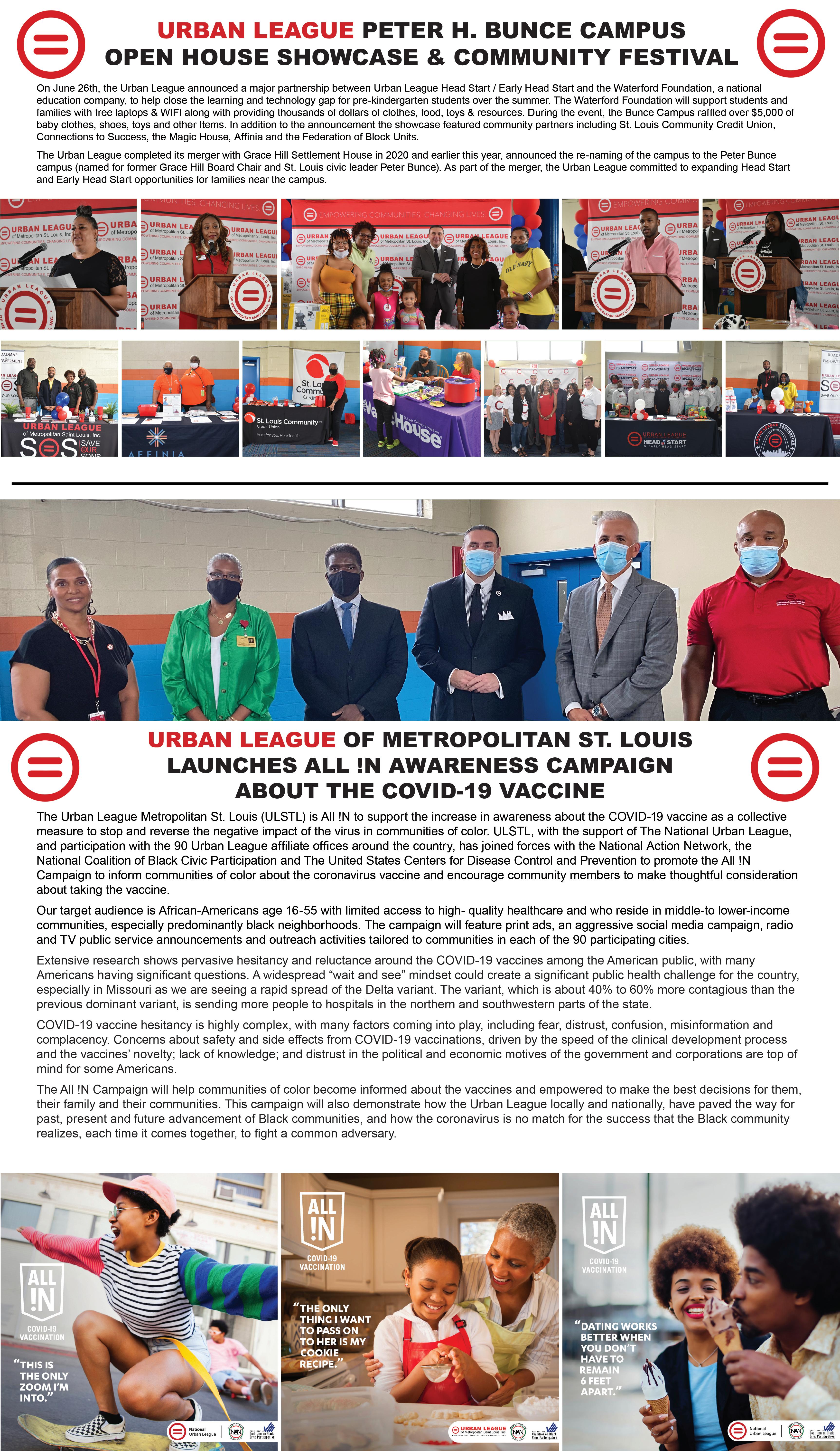
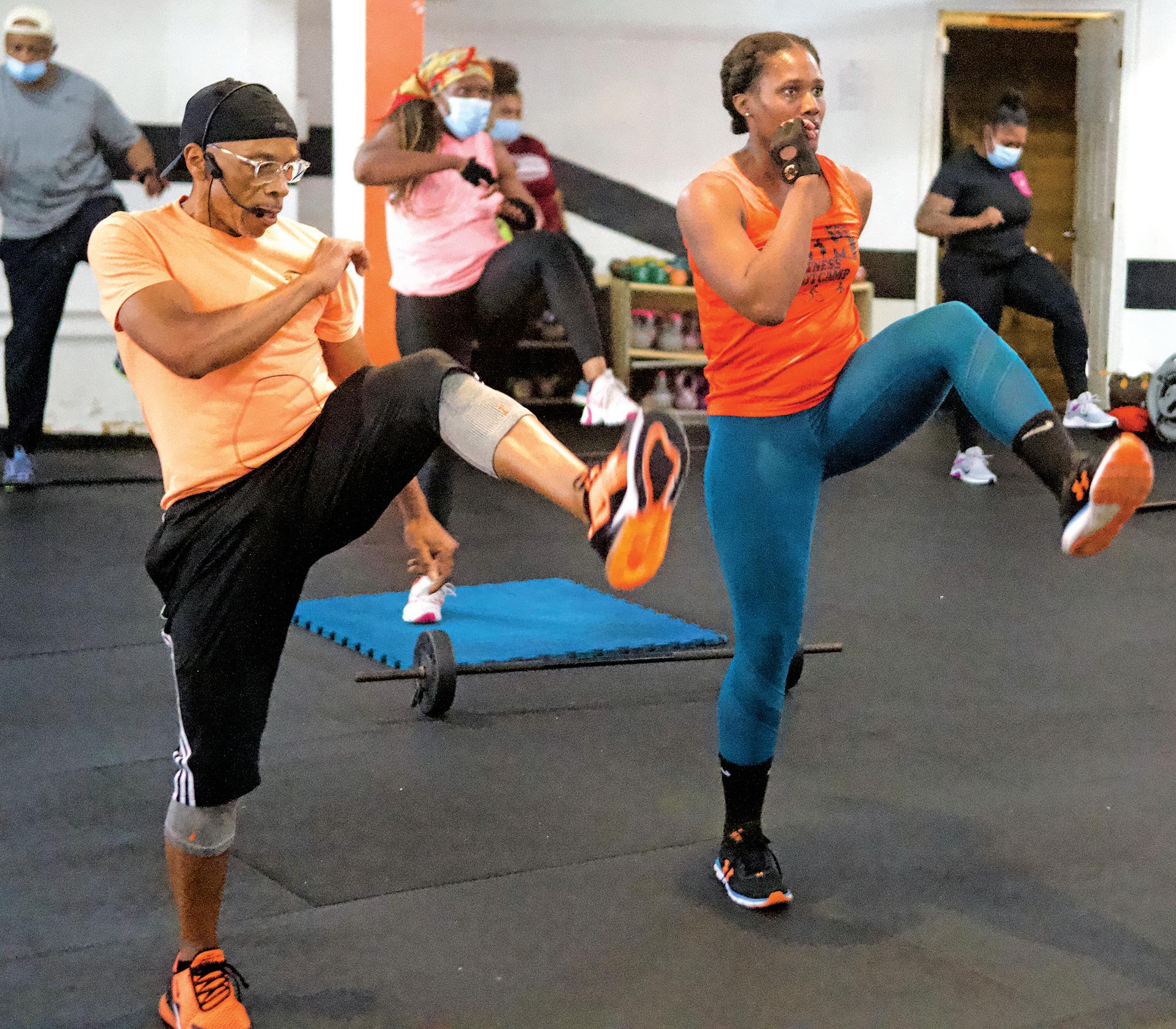
‘It’s been a rough go,’ says owner
By JoAnn Weaver
The St. Louis American
Helping people stay fit was a tough exercise while Briant K. Mitchell was trying to stay in business.
“I lost 65% of my business due to the COVID-19 pandemic,” said Mitchell, BKM Bootcamp owner.
Mitchell opened the business in Ferguson on August 1, 2008, and offers cardio workouts, nutrition counseling and weight training.
“A combination of the three will cause your body to do things that you never thought were possible,” he says on BKM’s website.
The pandemic forced Mitchell to close the gym doors to the public, but he came up with creative solutions to keep health and fitness programs going.
“It’s been a rough go,” Mitchell said.
“In the beginning, it wasn’t as bad because I was fortunate enough to
have virtual classes. I had to figure out a way to capture the attention of people here in St. Louis and out of town. However, over the course of time, people started getting bored with the Zoom workouts, which caused the membership to drop.”
Safety has been a top concern for BKM Bootcamp over the course of the pandemic, and strenuous cleaning activities occur before, during and after workouts.
“I do my best to talk to people and encourage them to work out,” Mitchell said. “God forbid anyone catch COVID-19, some of my members actually did.”
According to National Institutes of Health research, people who exercise have stronger immune systems, which can help combat COVID-19 and other diseases.
“We are fortunate enough to not have lost any clients to the COVID-
Frequent flyer Carla Granger still COVID-19 wary
By Sylvester Brown Jr. The St. Louis American
Carla Granger has worked the past 21 years as a maintenance mechanic at the downtown post office. She lives in south St. Louis, her kids are grown, she’s single and travels when she chooses. A trip to the Bahamas in 2014 solidified her resolve to vacation, in and outside the United States, at least four times per year.
n “I’m not going to be moving around freely… not until I feel like they’ve gotten a better handle on this virus.”
– Carla Granger, frequent traveler
“I’ve traveled within the states with my parents and grandparents but that was my first trip outside the United States, and it was like, ‘OK, this is it, I’m hooked!’” she said.
Granger created a bucket list of places she’d like to visit. It includes destinations in the Caribbean, Paris, Italy, Germany and other European locations. As COVID19 began its rampage in January 2020, she took a cruise to Puerto Rico, St. Thomas and other private islands in the Bahamas.
“They were taking precautions then,” Granger remembers.
“We all had to sign waivers stating that we didn’t have any flu-like symptoms and there were restrictions on the cruise like no buffet and things like that.” A month later, in February, the Diamond Princess was quarantined immediately after it arrived in Japanese waters, with 3,711 passengers and crew members on board.
The ship was the site of the largest COVID-19 outbreak outside of China at the time. The CDC noted that outbreaks on cruise ships
See TRAVEL, A10

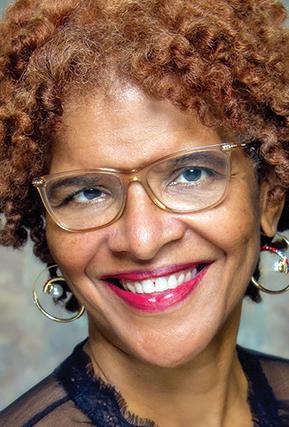
Cheryl D.S. Walker, interim president and CEO of Deaconess Foundation and an experienced attorney, has been elected to the Midwest BankCentre legal board of directors. She serves as chair of the Missouri Ethics Commission, president of the St. Louis Regional Health Commission, vice president of the St. Louis Regional Arts Commission, board member for St. Louis Business Empowerment Center and as a commissioner on the

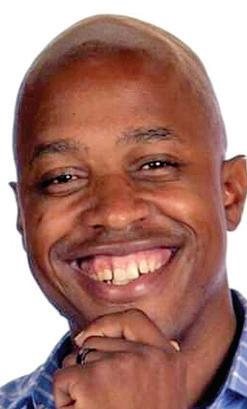
While taking COVID-19 precautions, Carla Granger has returned to her travel routine in 2021. She recently visited Chicago and snapped this shot of herself on Lake Michigan with the city’s familiar skyline in the background.
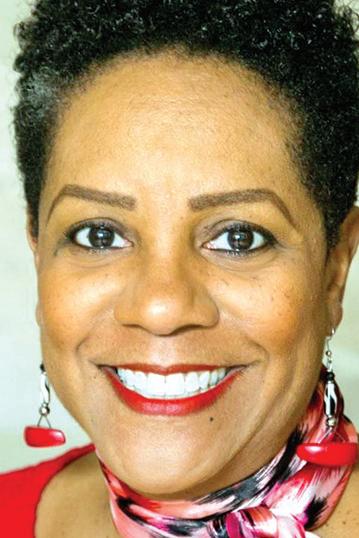
joined the firm’s Alliance Advisors Division as director of talent solutions. Frazier founded CAREERCompass, LLC, a speaking and career coaching/strategy firm in St. Louis. She also spent 25 years recruiting talent to six organizations across four industries leading the talent acquisition function for four of those organizations, including one global team.


Continued from A9
could be common because of the close confines and high proportions of older people who tend to be more vulnerable to the disease.
The travel industry has taken a hard hit in the past year. According to the U.S. Travel Association, international and business travel spending fell 76% and 70% respectively last year. From March through the end of 2020, the association stated, the pandemic resulted in $492 billion in cumulative losses for the entire U.S. travel economy.
As the pandemic started to spread, Granger took a trip to Chicago.
“I was a little nervous about that one,” she admitted. “They were very strict in Chicago. People had to wear masks, stay six feet apart…the whole nine yards.”
The trips to Puerto Rico and Chicago were the only two Granger took last year. This year, with vaccinations up and coronavirus infections down worldwide, Granger is revisiting her bucket list. She went to San Juan Puerto Rico in March. It was quite different from her early 2020 trip, Granger said.
“It was much stricter. You had to get a COVID test before you went. They had a curfew. It was midnight when I went, and the police were out in force. If you were out after curfew or not wearing a mask, even on the street, you were going to jail.”
Granger described herself as “vaccine hesitant.” Although she hasn’t been inoculated for the virus, she has no doubt it’s real and deadly. It’s why she’s always adhered to rigorous safety precautions.
“I’ve been tested at least 10 times. At one point, it was like once every six weeks.
I’ve had several family members who’ve had COVID, so I believe in it wholly. That’s why I’m not traveling as much as I would normally.”
Granger was just hours away from boarding a plane back to St. Louis when she spoke with The St. Louis American. She was struck by the differences between her 2020 and 2021 visits.
“Now, everything is 100% open. People were walking around without masks. They really didn’t have to, even though some stores and hotels said masks were required. The whole limited capacity thing was also totally different this time around.”
Granger isn’t sure if she’ll squeeze four trips into her itinerary this year yet.
“So, it’s like travel…yay! But we still have these variants popping up and we don’t know how effective these vaccines are with these new variants.”
The Centers for Disease Control (CDC) is recommending caution for summer travelers. It advises that the fully vaccinated traveler is the safest traveler. Those who are not, the CDC warns, should avoid travel, especially on cruise ships.
Older adults and people of any age with certain underlying medical conditions are still more likely to get severely ill if
they get COVID-19. Passengers coming to the United States by air, including U.S. citizens and fully vaccinated people, are required to have a negative COVID-19 test. The CDC recommends they have their negative result no more than three days before travel or documentation of recovery from COVID-19 in the past three months before they board a flight to the United States.
Granger’s fears about COVID variants are legit. The CDC said that the “Delta Virus,” a highly transmissible variant first identified in India, is now sweeping through the United Kingdom and makes up about 10 % of COVID-19 cases in the U.S. The Delta strain, health officials say, may carry a risk of more severe illness and transmissibility.
Research is ongoing but scientists say that two doses of the Pfizer and AstraZeneca vaccines are 96 % and 92 % (respectively) effective against hospitalization from the Delta variant.
It may be a couple more years before Europe is scratched off Granger’s bucket list. As a “vaccine hesitant” individual, she said she’s staying on the side of caution.
“COVID is going down in some parts of the world and that’s good. But I’m not going to be moving around freely… not until I feel like they’ve gotten a better handle on this virus.”
Sylvester Brown Jr. is The St. Louis American’s inaugural Deaconess Fellow.

Continued from A9
19 pandemic,” Mitchell said.
“Using small group classes where people wear a mask has been our way to combat the pandemic while opening our doors for people to return to do in-person workouts.
“Clients, who have gotten really sick from the virus, testified to me that if they not been in good shape, then they don’t know if they could have survived it.”
BKM Bootcamp re-opened to the public May 1. Capacity for in-person workouts is 50 people, although county guidelines allowed businesses to expand to 50% in February.
“Before the pandemic, between 100 and 150 people would come to the gym daily for workouts,” Mitchell said.
“I’ve recently added more
classes to accommodate more people in smaller classes to make everyone feel safe.”
Although this has been a tough time for the gym, Mitchell believes helping the community in health and fitness is his true calling. This belief has kept him going through the hard times.
“Knowing that I serve a purpose helps me to keep going every single day,” Mitchell said.
“Eighty percent of my income comes from the gym; I should have been able to coast through the pandemic, but my income has been affected because I continuously give to so many people.”
The 7,400-square-foot facility has become a place where people can go for a life-changing experience.
“People need this gym,” Mitchell said.
“I didn’t know it.
Sometimes I still don’t believe

it, but people come up to me and tell me ‘You saved my life.’ I would do it all over again to save lives. If I had to go through a recession to keep my gym open to save lives, I would.”
More than 50 people have lost 100 pounds each through Mitchell’s fitness and nutrition programs.
Dr. Miranda Ming, Eagle College Prep regional executive director, joined the gym in 2014 and hit weight loss goals twice. She heard about BKM from fellow educators.
“I originally started at 225 pounds and lost a little over 30 pounds,” Ming said.
“After my traumatic pregnancy, I gained a bunch of weight and started at 266 pounds; I’m currently down to 161 pounds.”
Ming lost around 105 pounds in the last year at the Bootcamp. According to the educator, this was possible through hard work and accountability.
“It’s challenging, but you’re not in it alone,” Ming said.
“For so many of us who are juggling being a mom, wife and professional, it’s great to be in place where you’re nurtured and supported while also being held accountable for your own health and wellness.”
Mitchell plans to do more for the community.
“We plan to go into underserved communities and talk to them about health and wellness; it’s more than fitness, it’s also mind and body,” he said.
“I’ve seen the effects of the pandemic on adults, as well as our kids, who have stayed in the house eating snacks and playing video games. Now more than ever, people in underserved communities need to be aware of and learn more about health, wellness and fitness.”
Lawsuit alleges information for warrant was falsified
By Sophie Hurwitz
The St. Louis American
Late at night on February 21, 2017, over 17 officers with the St. Louis Metropolitan Police Department broke down the door of Don Clark Sr.’s house, shot and killed him in a noknock raid on a drug warrant. Clark was 63, in failing health, and an army veteran. His family say the charges were falsified, as they explained in a press conference on June 30th. And alongside the law firm ArchCity Defenders and attorney Jerryl Christmas, they are suing for recompense for their father’s death. The lawsuit, filed in federal court on behalf of Clark’s daughter Sherrie ClarkTorrence and her four siblings, alleges that SLMPD detective Thomas Strode failed to conduct a sufficient investigation and used false and misleading information to obtain the “no knock” search warrant for Mr. Clark’s residence.
In St. Louis “no-knock SWAT raids” are legal, and must be signed off on by superior officers as well as a judge: according to the St. Louis Metropolitan Police Department Office of Public Information, “All search warrants are reviewed by an officers’ chain of command and submitted to a judge through
the Circuit Attorney’s Office. However, under exigent circumstances, a “no-knock warrant” can be applied for, but it still follows the same process as above.”
After a judge approves a no-knock warrant, the St. Louis Metropolitan Police Department enters the home of a person suspected of a crime without warning, guns drawn. This is what occurred in Don Clark Sr.’s case. The suit names officer Nicholas Manasco as being the man who specifically shot Don Ray Clark Sr., and detective Thomas Strode as the man who applied for the warrant—and, the suit alleges, falsified the information that got him the warrant in the first place.
Judge Barbara Peebles signed the warrant for this noknock SWAT raid. Along with the raid on Clark’s house, she authorized two simultaneous raids on other houses on his block.
Over the past several years, multiple people have been killed by SWAT teams executing no-knock raids in St. Louis: two of these killings occurred in St. Louis in 2017 alone, that of Clark and that of Isaiah Hammett (21). In 2020 the police killing of Breonna Taylor brought the issue of noknock raids into the national consciousness. In June 2020,


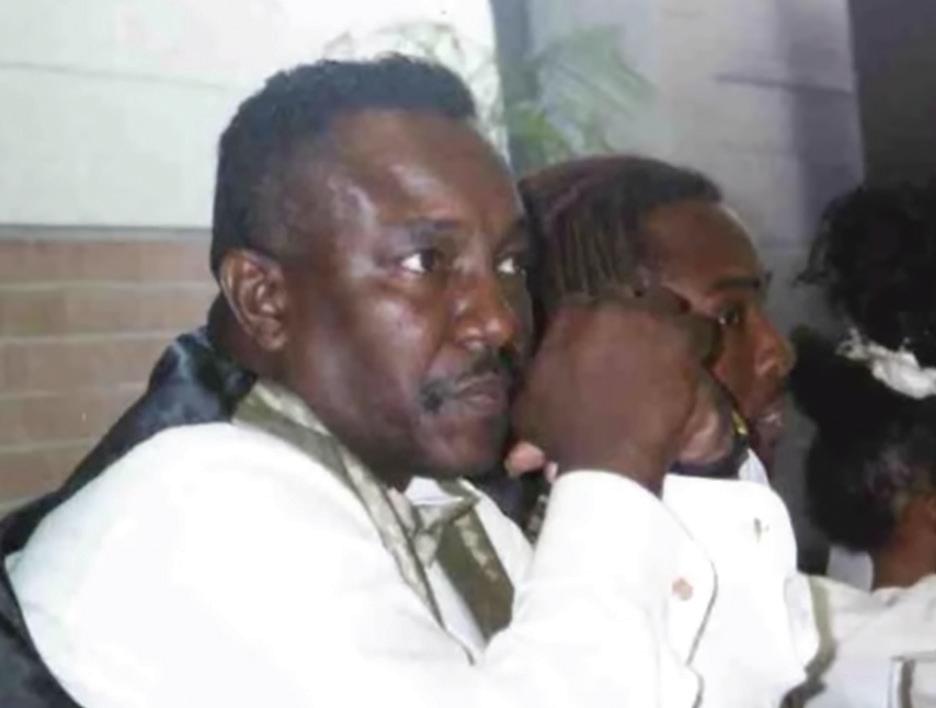
Louisville passed “Breonna’s Law,” banning the issuance of “no knock” warrants, and similar legislation has become law in Lexington, Kentucky, Aurora, Colorado and Virginia. In the country as a whole, over
20,000 of these raids are conducted each year, per data from Vox.
Don Ray Clark Jr. described entering his father’s home hours after the killing in graphic terms: “I don’t know
Don Clark Sr., was shot and killed by St. Louis police on February 21, 2017 after officers entered his home with a “no knock” warrant. His family filed a lawsuit against the St. Louis Metropolitan Police Department on June 30.
Screenshot from Archcity Defenders video ‘The Family of Don Clark, Sr. Speaks Out’
if you all have ever been in a butcher shop…so much blood you could smell it,” he recalled. “The wall and the dresser and the floor was so covered with blood. At that time I knew. They didn’t have to tell me [he was dead]. There was so much blood on the floor.”
The defendants in the lawsuit are the specific officers involved, as well as the city of St. Louis, under whose policies this raid was conducted. “This tragic case highlights the serious institutional failures of the City of St. Louis in addressing SLMPD’s excessive and indiscriminate use of SWAT and ‘no knock’ warrants,” said Emanuel Powell, Skadden Fellow and Staff Attorney with ArchCity Defenders.
Clark’s family hopes this suit will lead to changes in the St. Louis area, and limitation on the use of no-knock warrants such as this one. They are seeking injunctive relief as well as monetary damages. “He was old. He couldn’t run…he couldn’t get away,” Sherrie Clark-Torrance said. “Those no-knock warrants are dangerous and need to be gone.”

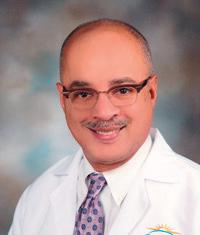

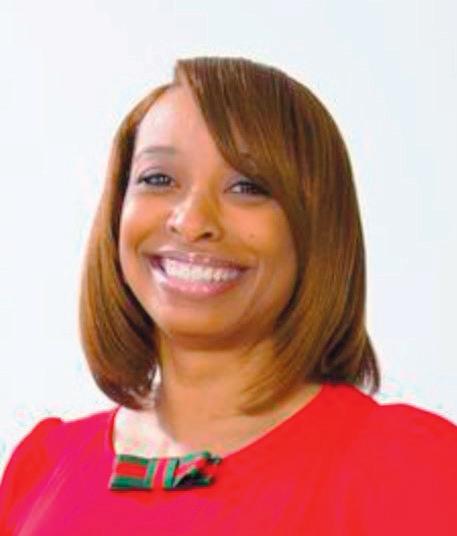



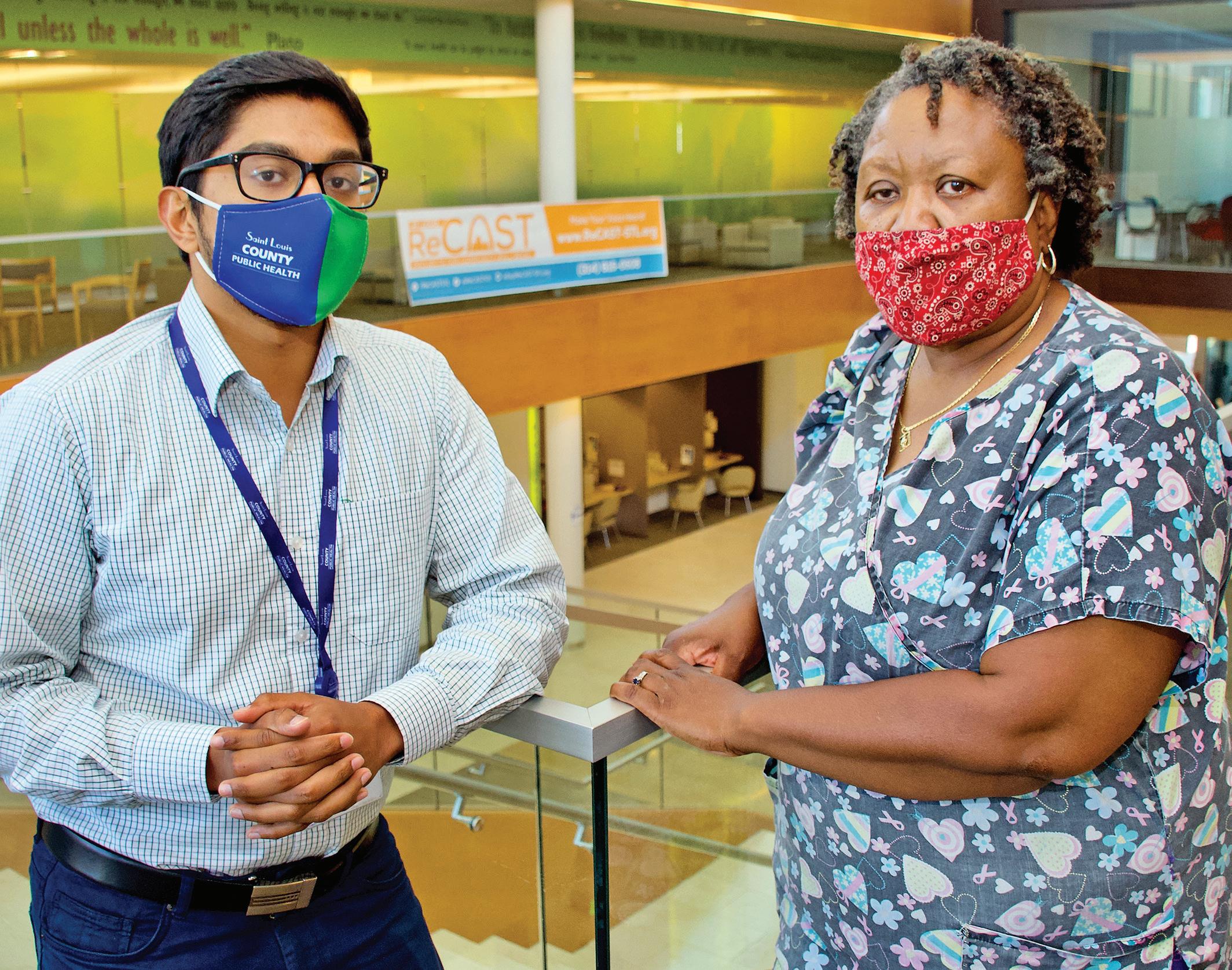
Resource
As Delta variant spreads, Black population still lags in shots
By Sylvester Brown Jr.
St. Louis American
“Let’s see; there’s ‘Vaccine Equity & Action.’ Another campaign is called, ‘Get the Facts!,’ said Christopher Ave.
“Yeah, and maybe we should add ‘get the vax,’” said Damon E. Broadus. Ave and Broadus, who work for the St. Louis County Department of Health, were recently brainstorming possible slogans for vaccine campaigns. Ave, director of communications, and Broadus, director of health promotions and

public health research, said the county is desperately trying to partner with churches, community groups, businesses and literally anyone else who can help convince undecided St. Louis County residents to get vaccinated. The county areas of highest concern are in majority or largely Black populated zip codes.
Nebu Kolenchery, county director of com-
Taking on maternal ‘toxic stress’
The St. Louis American staff
YWCA Early Head Start’s pregnant women’s services will receive a resource boost through a $75,000 grant from Healthy Blue. It can be allocated for assistance with rent or utility bills, food, formula, clothing and essential baby items.
“By addressing women’s basic needs and reducing toxic stress during their pregnancy and after delivery, we can ensure that both mom and baby are off to a great start,” said Stacy Johnson, YWCA chief program officer and Head Start director.
“Healthy Blue’s support will assist YWCA in meeting its goal of ensuring healthy delivery and sustained life for the at-risk population we serve.”
YWCA Early Head Start has a pair of Pregnant Women’s Centers serving 35 low-in-
come expectant mothers, 28 of whom are African American.
Located in areas with high infant mortality rates in St. Louis and Overland, the centers provide education in overall health, nutrition, parenting and safety for pregnant women.
There are peer support groups and assistance in finding health care providers and insurers, financial support and community partners.
Black babies are three times as likely to die before their first birthday than white babies, according to the Missouri Department of Health and Social Services. The infant mortality rate is the number of deaths that occur for every 1,000 live births.
“Infant mortality is a complex issue that is affected by more than just healthcare,” Sarah Kennedy, Generate Health STL senior manager,
municable diseases response, met with his colleagues to discuss the high percentage of unvaccinated individuals in “vulnerable, near north areas.”
It is a phrase Kolenchery uses to describe neighborhoods like Normandy, Riverview Gardens, Ferguson/Florissant, Hazelwood, Jennings and University City.
County Executive Dr. Sam Page called education “the biggest barrier” between residents and vaccinations.
“There are two main pockets of people
A popular question from my patients is: “Which blood test screens for cancer?”
Another frequent question is: “Can I get an MRI to check my entire body for cancer?”
Though these questions seem simple, the answers are more complex. There is no screening blood test for cancer, nor is MRI used as a screening test for cancer.
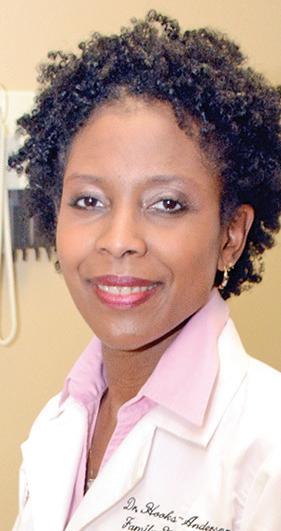
n Per the American Cancer Society, people with average risk of colon cancer should begin screening at age 45.
On the other hand, in honor of “National Black Family Cancer Awareness Week,” I do want to share information about the evidence-based screening tests that are available. It is important to remember that recommendations shared with patients have gone through rigorous studies, have been validated and reproduced. Over time the guidelines can change when new information becomes available. Furthermore, not everything that you see on Google, Facebook or TikTok is true. Some articles and patient testimonials are just anecdotal and are not scientifically sound. Please consider using reliable sources such as cdc. gov or medlineplus. gov for health information or better yet, discuss with your trusted provider. With that in mind, let’s talk about those guidelines that have been recommended by organizations such as the American Cancer Society (ACS), the American College of Obstetricians and Gynecologists (ACOG) and the United States Preventive Services Task Force (USPSTF).
Colon Cancer Screening
Per the American Cancer Society, people with average risk of colon cancer should begin screening at age 45. Average risk includes persons without a family history or personal history of colon cancer, persons without a history of polyps and persons without a history of inflammatory bowel disease like
See ANDERSON, A13
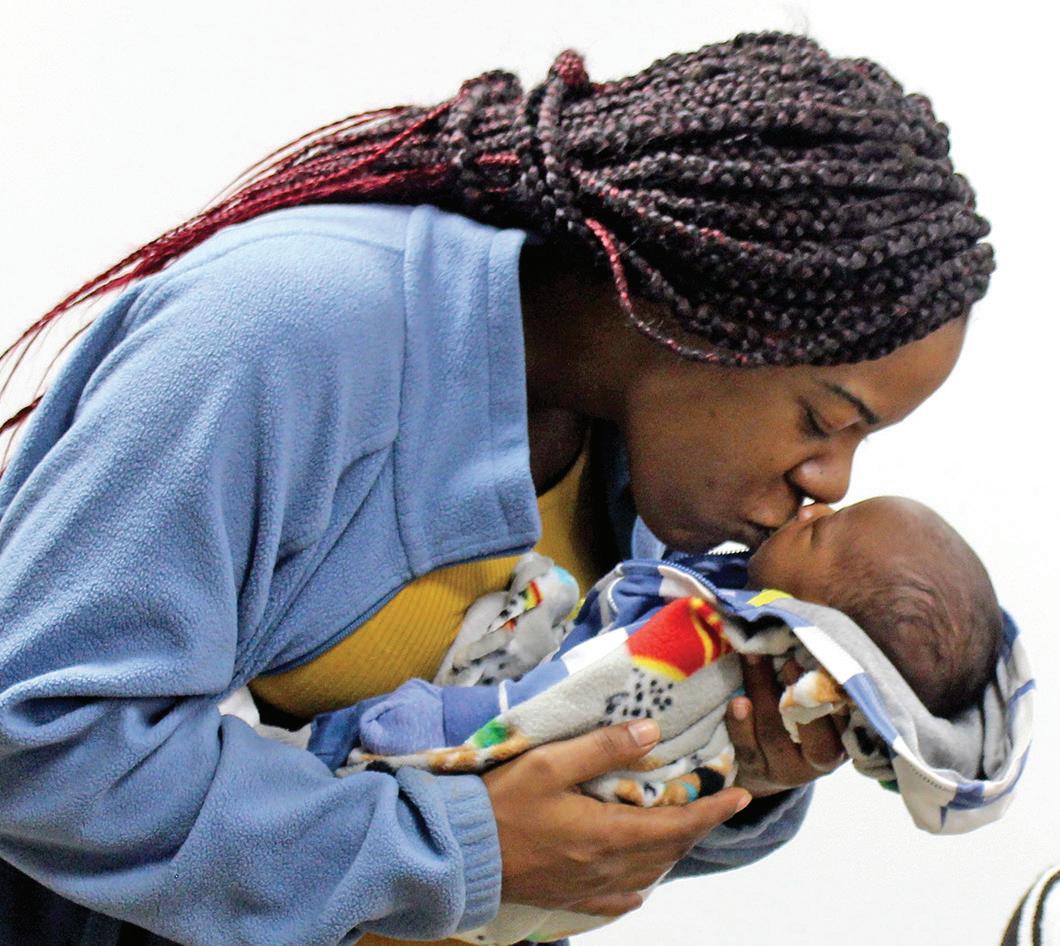


By JoAnn Weaver The St. Louis American
The Urban League of Metropolitan St. Louis unveiled a public education campaign focusing on vaccine hesitancy in the African American community June 6.
The campaign is in partnership with the National Urban League, the National Action Network and the U.S. Centers for Disease Control and Prevention. The target audience is African Americans from age 16 to 55 with limited access to healthcare.
Michael McMillan, president and CEO of the Urban League of Metropolitan St. Louis, spoke of the impact the pandemic has made on the Black community.
“There is a health and an economic imperative to address toward the African American community with regards to the pandemic,” McMillan said.
“We are working with clergy members and medical workers to create safe vaccination sites in predominately African American areas in St. Louis where vaccination rates are the lowest.”
In the last 14 days, there have been 203 confirmed cases with two deaths, according to the St. Louis city government website.
YWCA
Continued from A12
epidemiology and Evaluation, says on the city of St. Louis
Continued from A12 who are hesitant to get the vaccine: those who are philosophically opposed to getting the vaccine and those who are still a bit concerned that the vaccine is not safe,” he said.
“Our main barrier at this point in St. Louis County is an education gap. We’re doing our best to work with community partners and organizations like churches. We have an advisory group located in St. Louis County where we have been focusing our efforts to bridge this gap through clergy, business leaders and other civic organizations in North County.”
Officials’ heightened concerns come when Missouri leads the nation with the highest rate of new COVID-19 infections. The recent surge is due largely to politically conservative farming regions in the northern part of the state and southwestern corner –which includes Springfield and Branson. Although more than 53% of
Anderson
Continued from A12
Crohn’s or ulcerative colitis. Screening is typically every ten years but can occur more frequently depending on the medical history and the results of the screening test. There are basically two categories of testing options for colorectal cancer screening: stool-based tests and visual (structural) tests. The stool-based options include highly sensitive fecal immunochemical test (FIT) –testing is every year. Highly sensitive guaiac-based fecal occult blood test (gFOBT)
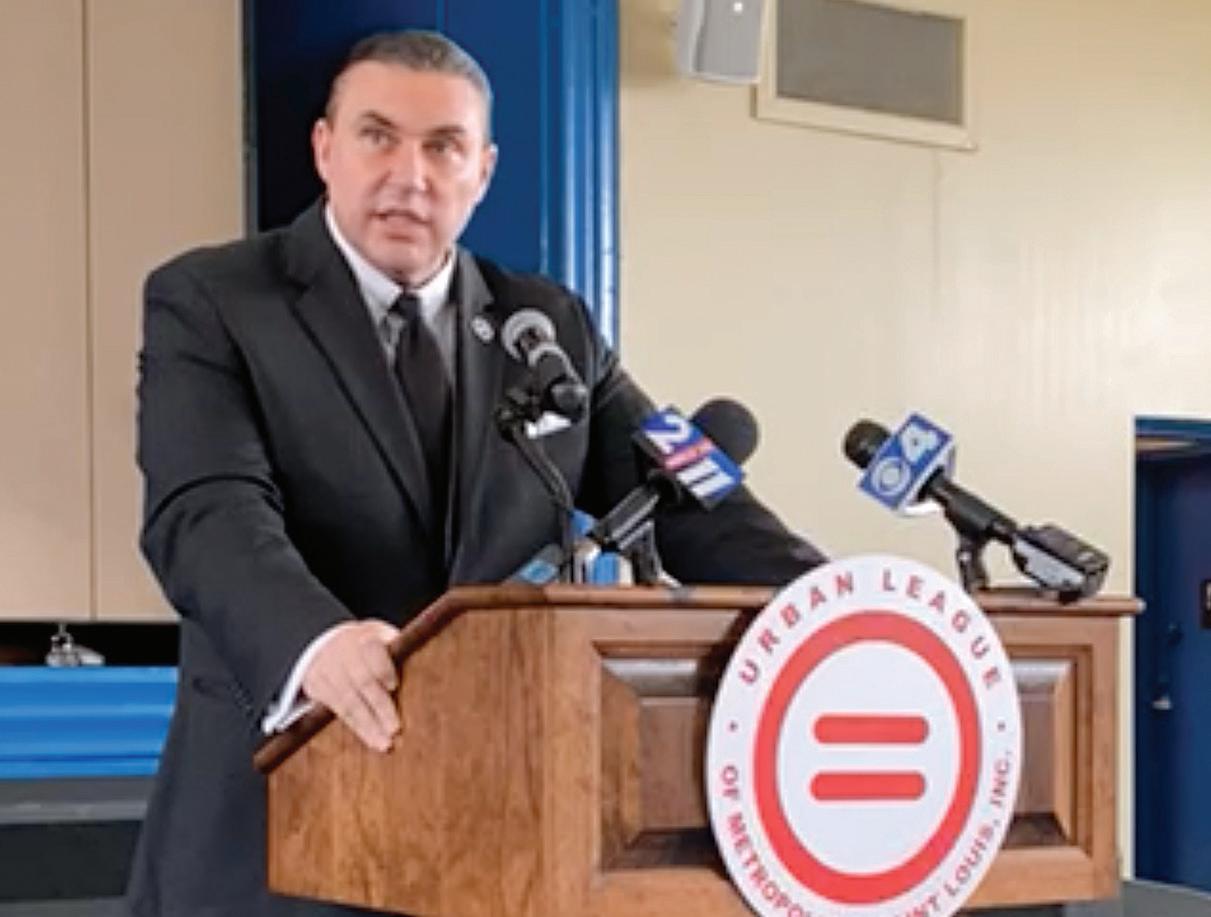
“Our goal for this campaign is to ensure the community is equipped with all the information available about their vaccine options,” McMillan said. The COVID-19 positivity rate has declined from
website. “Infant mortality is seen as the canary in the coal mine indicating that something is not right in our society. We live in a region with world class medicine, but Black babies are three
all Americans have received at least one shot, most southern and northern Missouri counties are well short of 40%. Pulaski County, home of Fort Leonard Wood, had a scant 13% vaccination rate.
As new COVID-19 infections cross the state, a new variant adds more concern.
Last month, the Centers for Disease Control and Prevention (CDC) officially recognized the “Delta,” a variant that may carry a risk of more severe illness and transmissibility.
This variant, which originated in India, is sweeping through the United Kingdom and now makes up 20 percent of new coronavirus-related US cases.
Nearly all current COVID19 deaths are people who have not been vaccinated, according to the CDC.
What should be a staggering endorsement for the vaccine’s effectiveness, unfortunately, is not.
In the St. Louis area for instance, according to Dr. Alex Garza, the city’s chief community health officer, more than 90% of patients hospitalized with COVID-19 have not been
- testing is every year, and the multi-targeted stool DNA test (commonly known as Cologuard) - testing is every three years. The visual tests include Colonoscopy – testing is every 10 years, CT colonography (virtual colonoscopy)- testing is every five years, and the Flexible sigmoidoscopy (FSIG) –testing is every five years.
Cervical Cancer Screening
Per ACOG, pap smears should occur every three years in average risk women from age 21-29. At age 30, testing should occur every
7.8% to 6.1%, but a boost in vaccination rates could effectively change this number due to its effectiveness against the virus and the Delta variant.
“A widespread ‘wait and see mindset’ could increase the infection rate of the delta
times more likely to die than white babies.”
Healthy Blue “continues to support maternal health in different communities. This is particularly important in communities where health
vaccinated.
Kolenchery monitors situations that could become a public health threat like anthrax, STDs and hepatitis. The “St. Louis County Cares” website features color-coded swaths of “COVID-19 Positive Cases by ZIP Code.” The more active areas (per 100,000 residents) are highlighted in deep purple on the site.
When Marilyn Peaston, a case worker with the Health Resource Center in the city, saw the webpage on Kolenchery’s computer monitor, it broke her heart.
variant of the virus,” Patricia Washington, Urban League executive vice president of communication, said. The goal of the campaign is not to pressure residents to get the vaccine, but to bridge the education gap and
disparities have significantly affected outcomes,” according to Johnson. Healthy Blue is a Medicaid service offered by Missouri Care, Inc., a MO HealthNet Managed Care health plan. It
Peaston and Kolenchery served an internship with the Resource Center as St. Louis University undergrads. When Kolenchery shared the map and predictions of possible Delta variant outbreaks in the county, particularly Black zip codes, Peaston knew she had to act.
n “Missouri is first in net new cases for the Delta Virus. There’s a surge in rural Missouri that’s going to make its way here.”
– Nebu Kolenchery, director of Communicable Diseases Response for the St. Louis County Health Department
“The majority of the areas were Black. I just couldn’t believe it,” Peaston said.
“It’s selfish of an adult to not get vaccinated, especially when kids 12 years old and younger don’t have a choice. They can infect these children and it’s just not fair.”
three years if performing pap smear only, every five years if testing with an FDA-approved primary hrHPV test, or every five years using the co-testing technique (pap smear plus hrHPV testing). Women who have undergone surgical removal of their uterus and cervix for non-cancerous reasons, no longer need pap smears as well as women over the age of 65.
Breast Cancer Screening
For breast cancer screening, ACOG and the ACS recommend starting yearly mammography at age
Michael McMillan, president and CEO of the Urban League of Metropolitan St. Louis, said there are health and economic reasons for addressing vaccine hesitancy in the Black community during a press conference on Tuesday, July 6 announcing a public education campaign in partnership with the National Urban League, National Action Network and the U.S. Centers for Disease Control and Prevention.
concerns through a targeted campaign through social media, TV, PSA announcements and other media pathways.”
“We know we cannot do it alone, but we look forward to working with partners to get the messages to our intended audience,” Washington said.
Dr. Frederick Echols, interim health director of the St. Louis Health Department, provided information on the Delta variant and the urgency of addressing hesitancy to prevent further outbreaks.
“We are starting to see an uptick in cases in ZIP codes for St. Louis South City and St. Louis County that have the lowest vaccination numbers,” Echols said. “We see the trajectory starting to repeat a pattern that we have seen over the last few months.” The following ZIP codes, in both St. Louis County and the city, have the highest case rates: 63101, 63103, 63113, 63136, 63147, 63139 and 63119.
provide information to alleviate hesitancy around the vaccine.
“Fifty percent of the population are not vaccinated because they want to know that the benefit outweighs the risk,” Washington said.
“We will address these
contracts with the Missouri Department of Social Services. YWCA Head Start and Early Head Start provide education and healthy development services for children from infancy to age five whose
school district to host vaccine locations. It’s why we’re working with Delta Sigma Theta sorority and universities. It’s why we’re hosting barber and beauty shop and faith-based initiatives.”
Ave said the partners recognize and respect the reasons of those who may be vaccine hesitant. For example, he said many people’s mistrust of the medical system is valid.
“I felt kinda hopeless, so I asked Nebu, ‘what can I do to stop this?’”
Kolenchery’s answer led Peaston to call The St. Louis American. Simply put, the team wants community partners to help spread a proactive message about vaccinations.
“There really is a sense of urgency and that’s why we want to create more partnerships specifically in the zip codes where people are unvaccinated,” Broadus explained.
“For example, we’re partnering with the Jennings
40 for average risk women. Women without a personal or family history of breast cancer, women without a known history of a genetic mutation that increases breast cancer risk (BRCA gene), or women without a history of chest radiation prior to age 30 are considered low or average risk. Women with a family history of breast cancer may need to start screening earlier and receive additional imaging studies such as ultrasound and MRI. Women should consult with their primary care provider to discuss their risks and develop the appropriate screening schedule.
“If you look at that history, and not just the ancient history, there are legitimate reasons for mistrust. We get that. We respect that. However, it’s our job to make it as easy as possible for everyone to get vaccinated,” he explained.
Both Ave and Broadus believe making it “easier” revolves around trust and providing accurate information.
“I have family members who, no matter the science or research, say they’re not taking the shots,” said Broadus.
“Unfortunately, they get a lot of misinformation from social media, and it takes a lot to overcome misinformation with accurate information.”
The county wants to partner with ministers, politicians and
Screening guidelines for prostate cancer are probably the most controversial and depend upon which governing body providing the guidelines. In 2012, the USPSTF recommended against routine prostate cancer screening for several different reasons. As a result of advocacy from several organizations, the USPSTF revised their guidelines in 2018 to say that for men aged 55-69, the decision to screen should be an individual one. The USPSTF and the American Urological Association recognize that for some men, such as African
“The cases seem to be disproportionately affecting predominately Black neighborhoods in the St. Louis area,” Echols said. “We are seeing a rising number in transmissions, but we need to stay ahead of it.”
family income is at or below the federal poverty level. Health screenings and multiple, varied programs involving parents and siblings are included with services provided.
immigrant and refugee agencies like Vintendo4Africa in North St. Louis County. The “Vaccine Equity & Action,” slogan Broadus and Ave mentioned is designed to acknowledge inequities while proactively informing underserved communities.
“We fight disinformation with good, legit information,” Ave said.
“Our job is to respect people’s beliefs and thought-making processes. Rather than doing a song-and-dance about how the vaccines work, we try to provide them with unbiased, real information.”
The main reason for the county’s increased outreach efforts are self-serving, Kolenchery stressed:
“Missouri is first in net new cases for the Delta Virus. There’s a surge in rural Missouri that’s going to make its way here. Honestly, we think it’s already here and spreading. Getting vaccinated is the best way to protect yourself,” he said.
For more information visit: https://stlcorona.com/ Sylvester Brown Jr. is The St. Louis American’s inaugural Deaconess Fellow.
American men and men with a family history of prostate cancer, their risk is higher, and testing may need to reflect their risk of developing prostate cancer. Therefore, men should discuss with their providers about the proper time to begin screening. Following evidence-based guidelines can potentially be lifesaving. As always, please discuss with your provider for more information.
Denise Hooks-Anderson, M.D., FAAFP is an associate professor and SLUCare Family Medicine interim assistant dean of Diversity Equity and Inclusion


By Danielle Brown The St. Louis American
It took just two weeks to set the stage. And the shows will go on. Susan Sherman, a former American Ballet Theatre board member, the Center for Creative Arts (COCA), the St. Louis Shakespeare Festival and the Whitaker Foundation have raised more than $100,000 to underwrite the production of ABT Across America
The eight-city, cross-country tour will feature ABT dancers in classical and contemporary ballet performances.
n In addition to ABT’s production, COCA will also host two ballet masterclasses taught by two ABT dancers; one for intermediate dancers and the other for advanced dancers.
Twenty dancers and 28 support crew members will hold outdoor performances in public parks and parking lots.
“As necessity is the mother of invention, I am delighted to announce ABT Across America,” Kevin McKenzie, artistic director of ABT wrote in a press release.
“With most indoor performing arts centers still closed, these outdoor settings will allow ABT dancers to share their artistry, excellence and optimism.”
The event will premiere on a custombuilt 40’x76’ stage that unfolds from an 18-wheel truck.
The 50-minute show incorporates Lauren Lovette’s La Follia Variations, an eight-person work set to music by Francesco Gemiani; Jessica Lang’s Let Me Sing Forevermore, a pas deux (a duet typically between a man and a woman) blending ballet and jazz vocabulary set to the music stylings of Tony Bennett; Darrell Grand Moultrie’s Indestructible Light, a celebration of American jazz music; and a classical pas de deux from ABT’s own repertoire. Sherman, who served on the ABT board a decade ago, said she kept in touch with the company. When told about the prospective tour, she knew the Shakespeare Festival and COCA would be great partners.
“I went to Shakespeare because they know how to create something outdoors with the festivals they have every year,” Sherman said.


By Danielle Brown
The St. Louis American
“A misconception between wants and needs,” LaQuinton “GQu3” Battle says at the start of his 14-minute long “Lust For Life” short film. “I know I want you. I know I need you, but how do I separate the two? Ready to risk it all for something I think is love. Damn, is it love? Sometimes you just need that reminder.”
“I went to COCA because they have a huge dance program there and are very familiar with outreach.”
In addition to ABT’s production, COCA will also host two ballet masterclasses taught by two ABT dancers; one for intermediate dancers and the other for advanced dancers.
The company will host a beginner’s masterclass for children enrolled in the Boys and Girls Club of Greater St. Louis’ summer camp program. Each class originally had 14 students, but it’s since increased to 20.
“Bringing American ballet is huge for St. Louis and it’ll almost be for nothing if we
didn’t involve the community forces with it,” Antonio Douthit-Boyd, co-artistic director of COCA, said.
“I think it was important to us the moment ABT said they wanted to do outreach and we thought the Boys and Girls Club was the perfect place for children to get their first ballet lessons from huge icons and stars.”
In the masterclass, the young students will learn ballet etiquette, which includes how to prepare themselves and dress for class.
See Ballet, B8
By Danielle Brown The St. Louis American
Longtime friends Jesse Alex and Lamar Johnson Jr. could have dwelled on not having an active father in their lives while growing up. Instead, they turned their shared experiences into a positive and created Dear Fathers in 2019. Dear Fathers is a multimedia platform dedicated to celebrating fatherhood, brotherhood and mental health awareness among Black men. The platform’s inception came from conversations the pair had about their similar upbringings. They would joke about not knowing how to grill or fish and dealing with absent fathers. They soon realized the pain they were laughing at needed to be unpacked.
“Talking more about it, we realized the effects of not having a dad, not knowing half of who we were,” Alex said. “From those conversations with Lamar, we started to research the Black fatherhood space to see what was out there.” Alex said he and Johnson found that a lot of Black fatherhood brands focused on images, selling merchandise and hosting events. They wanted to dive deeper into those images of Black fathers.
“We created a media platform dedicated to telling stories about Black fathers from all
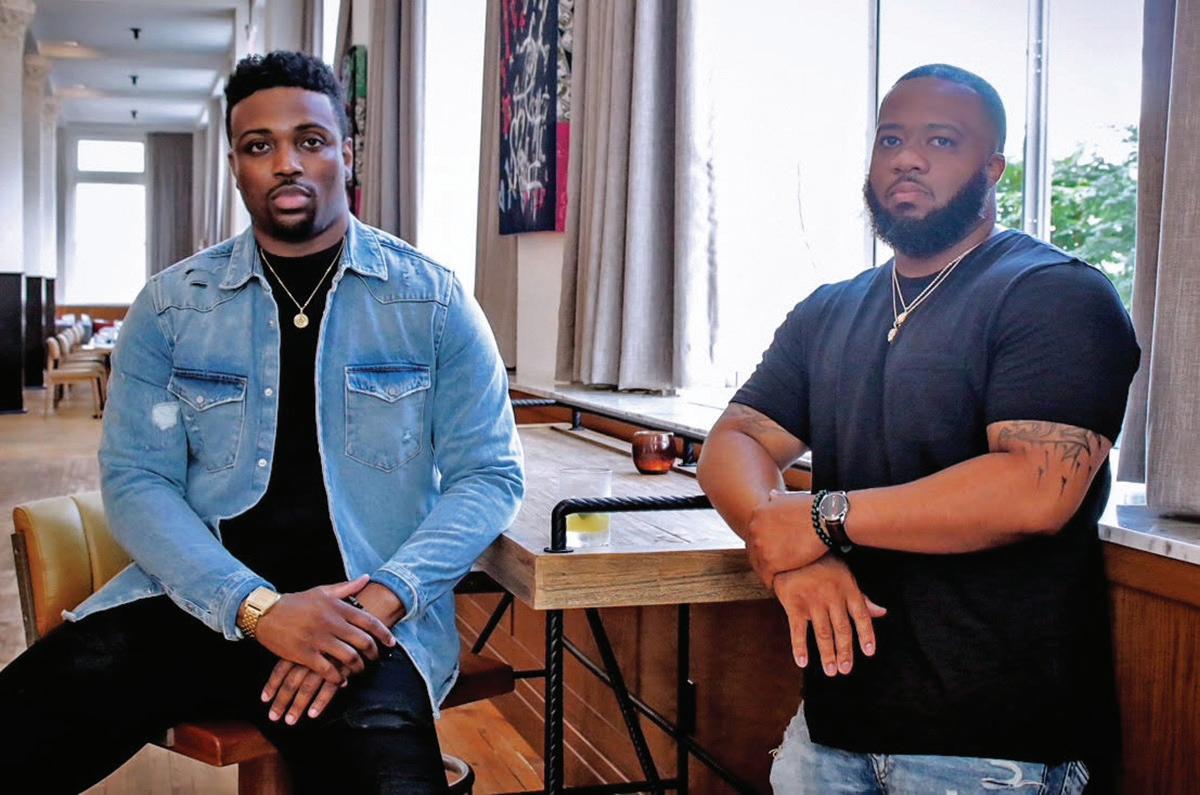
The film, shot and directed by cinematographer Drew “TheFilmLord” Brown, provides just the right amount of nostalgic feelings many get from classic Black romance films like “Love Jones.” Larenz Tate plays a poet in that feature, which is fitting because GQU3 is a poet and rapper.
The production includes GQu3’s flashbacks of a love lost. He realizes his current relationship doesn’t come close to his former lover. But as he reflects, he ponders on the difference between love and lust - which is what his previous connection paralleled.
n “I always strive to be different with my work. I knew I wanted TheFilmLord to shoot it because to me, personally, he’s the best here when it comes to actually getting certain shots that you want.”
- GQU3
“I think a lot of people get caught in the lust; thinking somebody might be the one for them,” GQu3 said.
“The whole time it may not be, but then again I still think that lust can be stronger than love. Maybe that lust can carry into something deeper going down the road.” Brown, who prides himself on collaborating with creatives who bring “great ideas and visions to the table” was immediately drawn to GQU3’s project and agreed it aligned well with his business mantra.
“It’s really hard to find people who have a vision for what they want. I like using references on what they love and what they feel emotionally,” Brown said.
“When he came to me with these movie ideas, I said ‘let’s do it.’ It was important to put his spin on what he wanted and have his artistry and acting skills go hand-in-hand with each other.”
GQU3 said it was all about executing something different and stepping out of his comfort zone with his work.
“We just really wanted to do something different,” GQU3 said.
“I always strive to be different with my work. I knew I wanted TheFilmLord to shoot it because to me, personally, he’s the best here when it comes to actually getting certain shots that you want.” Brown and GQU3 shot the film during the early days of the pandemic and were met with many challenges. Many locations were closed, but they were able to conclude what they call “a classic piece.”
Thanks to support through crowdfunding, Brown produced the film with monetary donations from community members.
“It was cool to do that and it was cool to see that other people that are on the outside helped me make this film,” Brown said.
“I like having as many people be a part of something as possible, while also getting the

In 1818, Missouri wanted to join the Union as a Slave State. A compromise was struck, and the horror of Slavery was once again expanded. There was no compromise for Slaves.
Our 2021 virtual event highlights the stories of Black St. Louisans whose lives were intertwined with Missouri’s journey to statehood and the legalization of slavery in the state.
Visit MaryMeachum.org to watch this year’s program, complete with re-enactments, local teens learning about the Missouri Compromise and more.
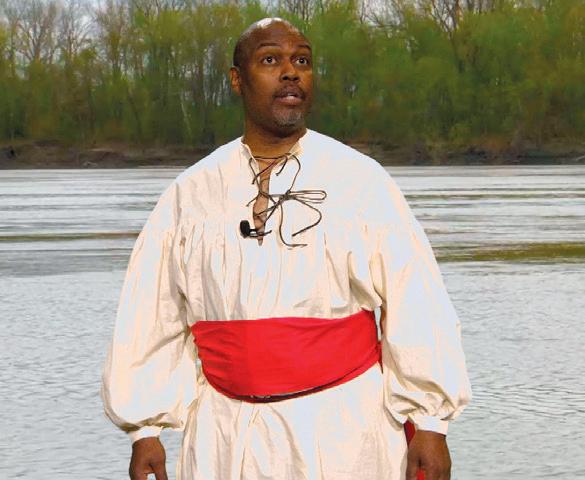
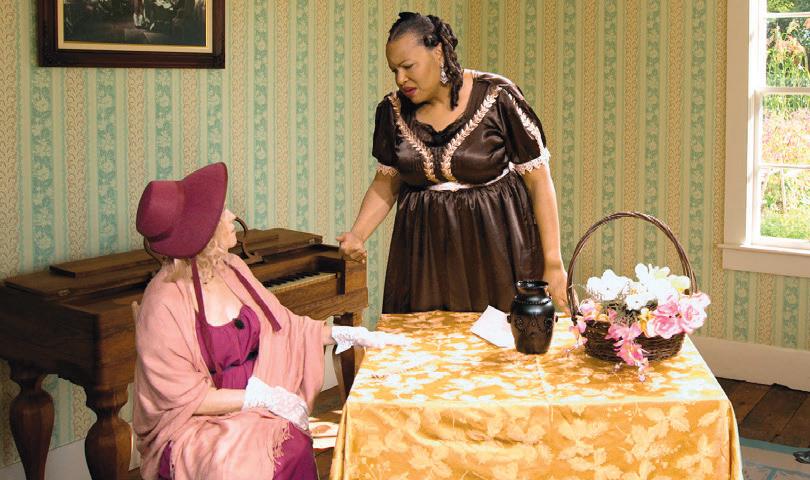
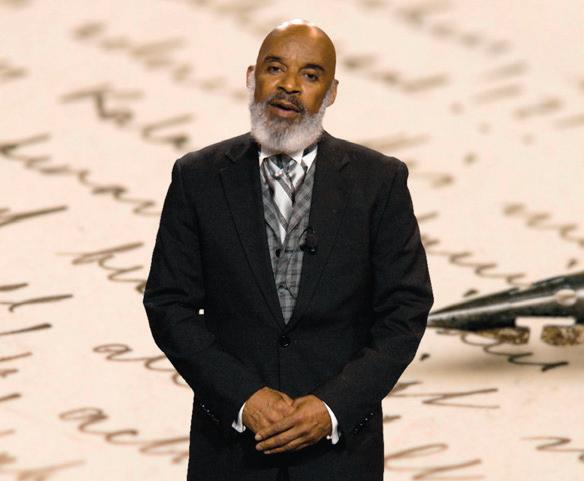
While the event is virtual, you can still visit the Mary Meachum Freedom Crossing site on the Mississippi Greenway in person. Learn more about Mary Meachum and the site at MaryMeachum.org

By Gwen Moore, Missouri Historical Society
History is about people’s stories, and everybody has a story to tell. Stories can be told in many ways: through the written word; oral testimonies; or people’s possessions, the things that they value or hold dear or that offer insights into their daily lives. Such possessions are the basis for developing exhibits, a way of telling vivid stories that educate, empower, and enlighten our visitors.
For the past several years the Missouri Historical Society (MHS) has been increasing its efforts to ensure an inclusive narrative by collecting items that reflect the full lived experiences of African Americans in the St. Louis region. Objects; photographs; home movies; first-person interviews, posters and art pieces; scrapbooks; journals; and documents in the form of church programs, club minutes, flyers, correspondence, and other papers have all been donated to MHS’s permanent collections through the African American History Initiative (AAHI). Each item tells a unique personal story. Together they tell the even more important story of Black community life and what it reveals about the place of African Americans in St. Louis at a particular point in time.
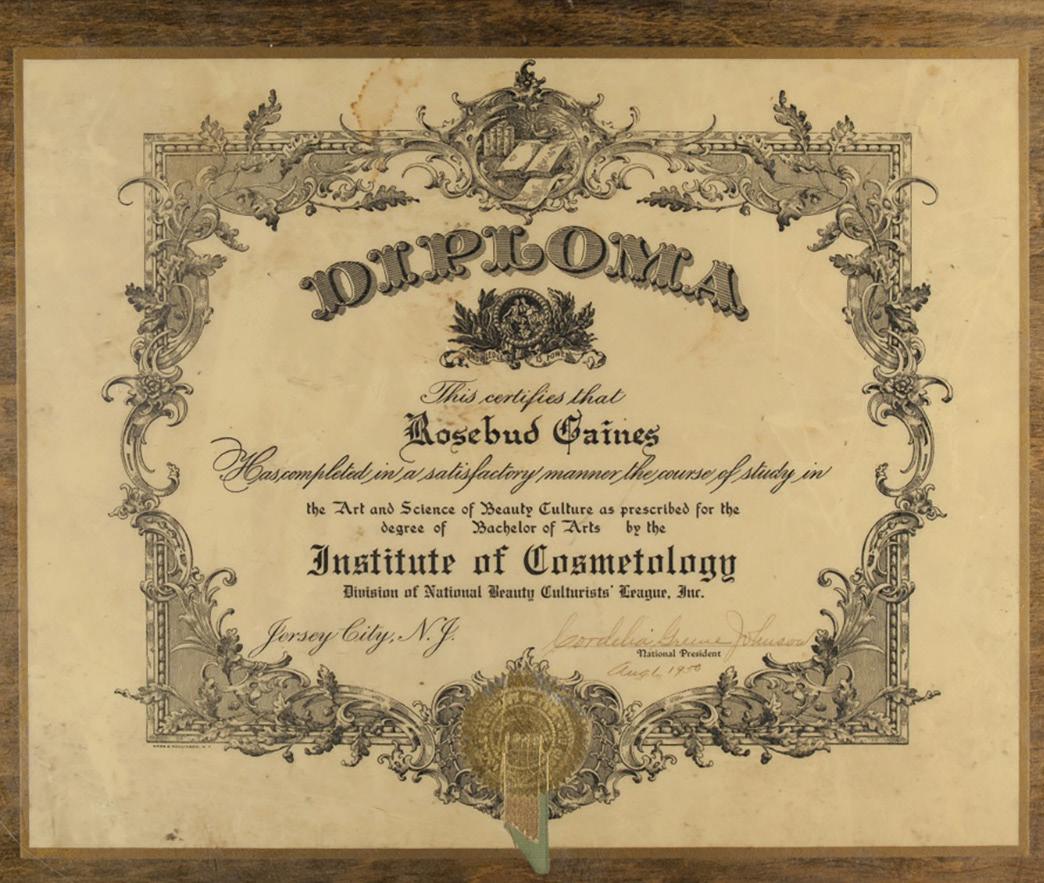
tions that offered a degree of economic independence and a shield from racial indignities.
•
•
•




One example is a gift of extraordinary photographs from the estate of Rosebud Gaines, a Black businesswoman who in 1950 expanded her home beauty salon to a larger salon in the Ville neighborhood. Sixteen years later she opened a cosmetology school, Rosebud’s Beauty Academy, which she operated until her death in 1973. The photographs of Gaines’s salon and school offer a rare glimpse into a profession that became a mainstay for Black women beginning with the pioneering work of Annie Malone, who gained wealth and influence through her shrewd business sense and development of products that catered to a largely ignored market. Malone’s success inspired untold numbers of Black women nationwide to follow suit. At a time when too many Black women were limited to work as domestic servants, beauty culture provided one of the few alternative occupa-
Rosebud Gaines’s story is now a valuable part of MHS Collections. There are many other Black stories that have been recovered or enhanced thanks to the AAHI. Through generous gifts like a desk set from the office of legendary civil rights attorney and activist David Grant, we learned more about his later work as research director for the St. Louis Board of Aldermen. The Shriner and auxiliary police uniforms of Collier Brothers Auto Body founder Raymond Collier opened a window into the businessman’s social and community life. A donation of garments made by designer and skilled dressmaker Mabel Preston provided insights into Black businesses and the role of African Americans in the city’s Washington Avenue garment district, where she got her start.
Rescuing items from the overlooked Black past is just one aspect of the AAHI. Collecting history as it happens is also a priority. We continue to search for items related to contemporary protest movements, such as posters, buttons, signs, flyers, photos, T-shirts,
murals, and interviews with activists. Launched initially as the Ferguson Collecting Initiative in 2014, this effort has expanded under a broader umbrella of social justice and has gathered items associated with the protests over the Jason Stockley verdict in 2017 and George Floyd’s murder in 2020. It is not always the dramatic or well-known event that captures the attention of museum collectors. There is a push to collect items that reflect the private and public lives of Black people, whether it be home and family life, work life, church life, school life, or social life, all of which are critically important. Though we can’t collect everything (I wish we could), MHS is seeking representative samples of the broad African American experience. Through the AAHI, we will be able to tell more of the African American story and give a full accounting of the true and authentic American story. To learn more about the Missouri Historical Society’s African American History Initiative, including events, collections, resources, and how to donate artifacts, visit mohistory.org/aahi.

Are you looking for quality child care or struggling due to COVID -19?
Enroll your child, ages 6 weeks to 5 years, in the Childcare Center at Guardian Angel Settlement Association and allow us to assist you and your child today!
Our center is State Licensed and Missouri Accredited.
All of our teachers have a Bachelors Degree and/or Early Childhood Certification.
We have implemented changes to reduce the spread of COVID-19.
Our classrooms are inclusive of children with disabilities.

Our center is accessible by


By Earl Austin Jr.
It was a season of firsts in boys track and field in the St. Louis metropolitan area.
We witnessed the crowning of a first-time state champion in the Mascoutah Indians in the state of Illinois.
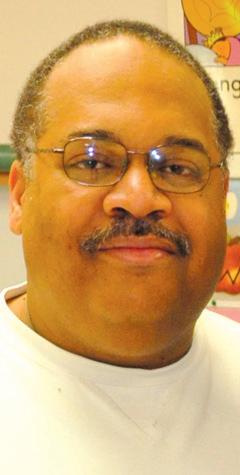
We also saw dynamic sprinters in senior Brandon Battle of Edwardsville and sophomore Issam Asinga of Principia. Both were dominant in sweeping the sprints at their respective state meets. Francis Howell’s dynamic duo of Mason Brock and Bryce Kazmaier comprised one of the nation’s best 1-2 tandems in the javelin.
To officially bring the season to a close, we present to you The St. Louis American All-Area Boys Track and Field team for 2021.
First Team
100-meter dash: Issam
Asinga, Principia (Soph.) and Brandon Battle, Edwardsville (Sr.) – Both won state championships in 10.6 seconds at the Missouri Class 2 and Illinois Class 3A state meets.
200-meter dash: Issam
Asinga, Principia (Soph.) –Won the Class 2 state champion with a meet record of 21.6 seconds.
400-meter dash: Brandon Battle, Edwardsville (Sr.) –

The Illinois Class 3A state champion recorded one of the nation’s best times, 46.48 seconds.
800-meter run: Baker Pashea, SLUH (Jr.) – Finished second in the Class 5 state meet.
1,600-meter run: Johnny Martin, Ladue (Sr.) – Finished third in the Class 5 state meet.
3,200-meter run: Andrew Smock, Ladue (Jr.) – Finished
third in the Class 5 state meet.
110-meter high hurdles: Devontae Ford, East St. Louis (Sr.) – The Illinois Class 2A state champion in 14.07 seconds.
300-meter intermediate hurdles: Sam Wright, Hillsboro (Sr.) – The Class 4 state champion in 39.0 seconds.
4x100-meter relay: St. Mary’s – The Class 3 state champions in 42.6
4x200-meter relay: East St. Louis – The Illinois Class 2A runners-up.
4x400-meter relay: Ladue
– Finished third at the Class 5 state meet.
4x800-meter relay: Marquette – Finished second at the Class 5 state meet. Long jump: Shawn Putman, MICDS (Sr.) – The Class 3 state champion with a jump of 22 feet 4 inches.
With Alvin A. Reid
Sophomore Issam Asinga of Principia was super when he won the sprint triple crown at the Missouri Class 2 State Championships in Jefferson City. He is state champion in the 100-, 200- and 400-meter dashes.
Put: Barry Evans Mascoutah (Sr.) – The Illinois Class 2A runner-up with a throw of 54 feet 7 inches. Discus: Barry Evans, Mascoutah (Sr.) – The Illinois Class 2 state champion with a throw of 176 feet 8 inches. Javelin: Mason Brock Francis Howell (Sr.) – The Class 5 state champion with a
4x100:
4x200:
4x400:
Triple jump: Myles Norwood, Trinity (Sr.) – The Class 4 state champion with a jump of 48 feet 6 inches.
High jump: Brendan Goellner, St. Charles West (Jr.) – Had the area’s best jump at 6 feet 9 inches.
Pole vault: Sullivan Gleason, Fort Zumwalt North (Jr.) – The Class 5 state champion with a clearance of 14 feet 8 ¾ inches.
Major League Baseball moved its 2021 All-Star Game from Atlanta to Denver in response to draconian voter restriction laws targeting African Americans passed by the state of Georgia.
“I have decided that the best way to demonstrate our values as a sport is by relocating this year’s All-Star Game and MLB Draft,” MLB Commissioner Robert Manfred said.
“Major League Baseball fundamentally supports voting rights for all Americans and opposes restrictions to the ballot box.”
In addition, the National League team will be guided by Black L.A. Dodgers manager Dave Roberts.
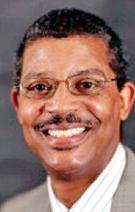
Alvin A. Reid
An election to determine the respective American and National League All-Star Game starters ended last week. Then, based in part on votes received, the pitchers and reserves were selected. The All-Star Game is Tuesday, July 13, at Coors Field, home of the Colorado Rockies, and just five Black players are representing their respective teams.
Of the 67 All-Star roster spots, only five will be filled by Black players. That comes to about 13.4%. My first reaction was, ‘that’s ridiculous.’ Then, I remembered that on Opening Day 2021 only 7 % of MLB players are Black. The All-Star Game rosters almost doubled that. Go figure.
The lone Black player on the National League roster is outfielder Mookie Betts – who plays for Roberts with the Dodgers. There are no Black starters on Roberts’ team. The American League has four Black players, including two starters. Toronto second baseman Marcus Semien and New York Yankees outfielder Aaron Judge will start for the AL. Houston Astros outfielder Michael Brantley and Baltimore Orioles outfielder Cedric Mullins were named American League reserves. Before his injury, St. Louis Cardinals pitcher Jack Flaherty seemed to be a lock to make the NL roster.
Had he made the team, he would be the lone Black pitcher on either roster. That’s right, there are no Black starting pitchers or relievers participating in the 2021 All-Star Game. Bob Gibson just did a roll under his Omaha, Nebraska, tomb stone.
Olympic ignorance
Sha’Carri Richardson, the American sprinter who was favored to win the women’s 100 meters during the Tokyo

Summer Olympics, will be watching the event on television thanks to the International Olympic Committee.
Richardson tested positive for marijuana. Its use by adults is legal in many American states including our neighbor to the east, Illinois. Athletes testify that THC, the active ingredient in marijuana, has saved them from painkiller abuse, depression and many other ailments.
But, so far, the IOC will not lift Richardson’s ban.
More than 200,000 people signed a MoveOn petition the first day it was posted last week, and issued a condemnation of the IOC and its igno-
rance on several social and racial issues.
“The imposition of a penalty against a world-class Black, queer, woman athlete is powerfully and infuriatingly reminiscent of the way drug laws are regularly applied in the United States,” it said in a statement.
“Recreational marijuana use has been de facto legal for upper-middle-class white people for years—something more states are recognizing as they legalize marijuana for all people and consider how to repair the damage done to Black and brown communities by decades of the war on drugs.”
L.A. Dodgers outfielder Mookie Betts is the only Black player on the National League All-Star Game roster. Dodgers manager Dave Roberts will lead the NL All-Stars and the American League team will feature four Black players, two of which will start the game.
I guess its members have never noticed that most people of color and white people have different types of hair. It is obvious.
A specially designed swimming cap that carries the appropriate name of “Soul Cap” is being sported by Black swimmers across the world. But the Olympic Committee has banned them. Apparently, it has been outlawed “because it doesn’t conform to the swimmer’s head.”
The smaller caps are insufficient for keeping hair dry, several Black swimmers told the BBC. Water is weight. It slows down the swimmer. This decision favors some swimmers and discriminates against others.
Ross Rebagaliti won the snowboarding gold medal for Canada at the 1998 Winter Olympics. After he tested positive for marijuana, he was stripped of his medal. He would later be reinstated as the winner because marijuana was not on the banned substance list.
He said the IOC’s Richardson decision makes him sad.
“The scientific evidence is there; that’s what should count,” he told The Province in British Columbia.
“The IOC should be a leader for humanity.”
It gets worse when it comes to humanity and the IOC.
FINA governs international competitions in water sports – but its authority comes directly through the IOC.
“There’s so many barriers for Black swimmers, and [Fina have] kind of put another barrier up – defeating the whole purpose of the work that I’m doing,” English swim coach Tony Cronin told Newsbeat.
“It just shows misunderstanding and ignorance. So, to see Soul Cap come out with a hat that actually helps us, but then to be told: ‘Yeah, we don’t want you to use them,’ it’s just terrible.”
By Cora Jackson-Fossett
Los Angeles Sentinel
Answering an invite to head east, the Rev. Kerry Allison is leaving Church of the Redeemer in South Los Angeles to serve as senior pastor of First Presbyterian Church of Ferguson, Missouri.
He will be the first African American spiritual leader of the 150-year-old congregation. Accompanying the pastor
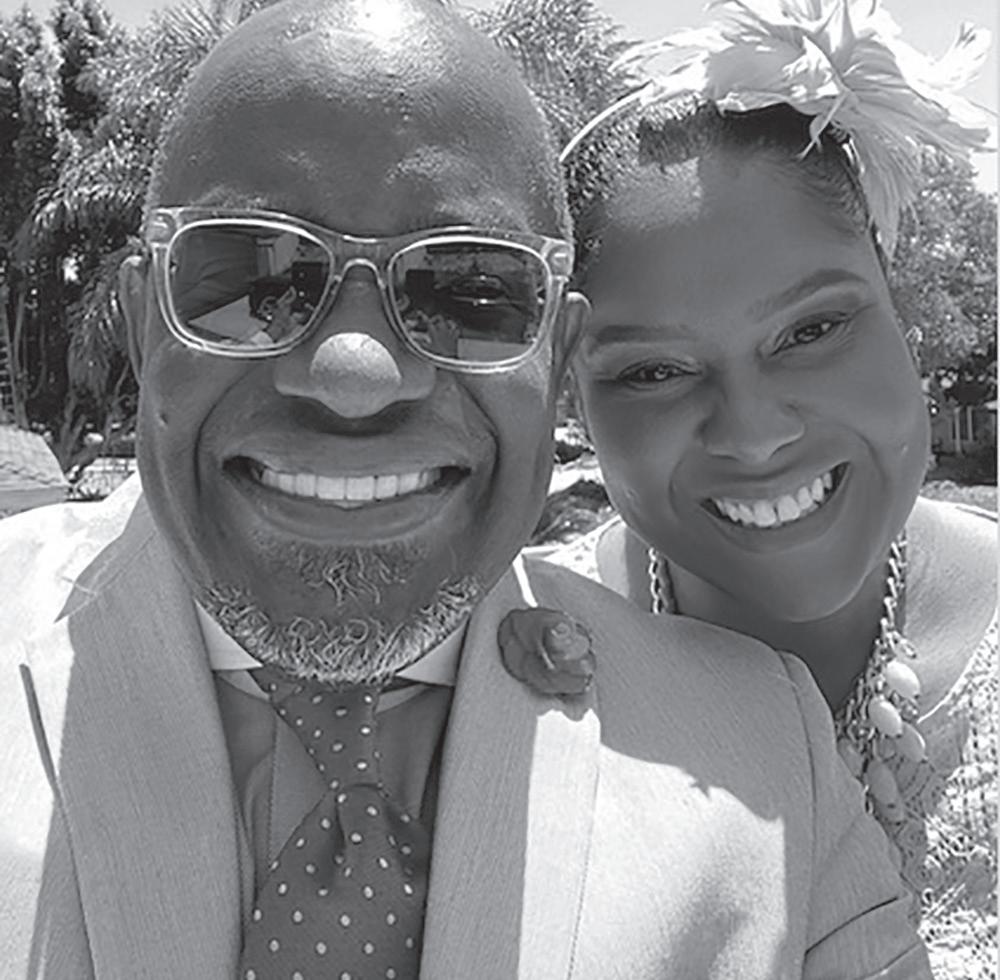
will be his wife, First Lady Oona Allison, who is an elementary school teacher and has already received employment offers from educational institutions in the area.
“Ferguson has all of the challenges of urban America – issues related to poverty, education and racism,” explained Allison.
“The majority White congregation of First Presbyterian desired to reach out to the community.”
his
By James Washington
Sometimes words alone cannot convey meaning and feelings the way we’d like them to. Trust for example. I know I’ve talked about this before so please humor me. The reference point for my meaning today is “Trust in the Lord with all your heart, and do not lean on your own understanding. In all things acknowledge Him and He will make your paths
straight.” Proverbs 3:5-6. Trust is such a complex thing. Have you ever been betrayed by someone in whom you had total trust? Have you been able to totally trust another person since? See how easily misplaced trust puts you in a terribly vulnerable place. It’s uncomfortable. It’s abnormal. It ain’t fun. Yet, in this passage, we are instructed to put our trust in the Lord. The question is can you do it? Are
After the turmoil arising from the fatal shooting of Michael Brown, Allison said, “The congregation wanted to be more involved in providing solutions and healing for the community. They knew that their leadership should reflect that. So, they set out looking for a Black or a person of color having skills in urban ministry and community ministry.” And Allison fit the bill. He added that First Presbyterian also wants a multicultural membership and Allison noted, “One of my tasks is to increase their participation locally and to help the church look like the community. They (the members) are interested in attracting people of
you able to put trust in your heart after you experience devastating betrayal? And we’ve all been betrayed in one way or another; either by having our beliefs proven false or maybe your heart has been broken.
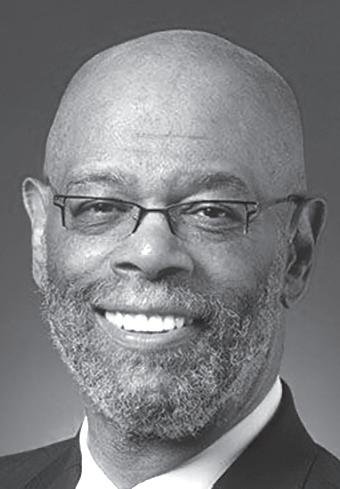
Everyone knows someone who has been crippled by a lover or spouse gone crazy, or, watched someone stumble upon the truth about a situation that everybody but them knew the real deal. In the real world, that kind of stuff hurts. In a real sense, once destroyed, trust ‘don’t’ come round here anymore. But now, wait a minute. Go out and trust in the Lord implicitly. You get my meaning? Extreme caution usually follows crippling
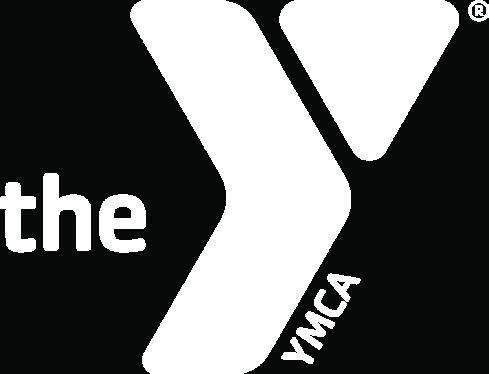



color, particularly African Americans.”
Acknowledging the big responsibility that lies before him, the pastor is nevertheless, optimistic about his future in Ferguson and impressed by the efforts of the membership.
“One thing I really admire about the congregation is that they see the need and are being intentional to address it,” said Allison.
“It does not mean there won’t be challenges in doing it. But they know that they need to change and do something different to help the community. That is really impressive to me.”
Allison’s last day at Redeemer was June 27 and the members gave him and his wife a gala, though slightly tearful, send-off. On Sunday, July 18, he’ll preach his first sermon and be installed as the new pastor of First Presbyterian Church of Ferguson. How does one leave L.A. for the St. Louis greater metropolitan area? Not easily,
betrayal.
New relationships are founded largely on mistrust and ‘prove it to me;’ not, blind faith and unconditional trust. Life teaches us that only a fool would allow themselves to be misused again. Therein lies my question about trust and what it means to you. Can you deal with this concept every day?
How much of a struggle are you having in trying to trust people who have taught you not to give them the time of day?
Do you treat all people this way or just the one(s) who betrayed you? Can you forgive? Can you ever forget? Do you really want to? And what does all of this have to do with God? How are you treating Him in the trust
area? “Now it is required that those who have been given a trust must prove faithful.” 1 Corinthians 4:2. Now exactly, who’s proving what to whom?
Are you requiring God to prove something to you before you trust Him? Are you demanding from God those same things you demand from someone, anyone before you would even consider giving him or her your love?
You see it is so easy to succumb to a lifestyle which requires proof before love is given. It’s so easy to demand the impossible from people who are incapable of giving it to you. But how can you base your relationship with God on worldly principles grounded in betrayal and disappointment?
Are you requiring God to prove His love to you before you give yours to Him? The key to
admitted Allison, who has served various churches in Southern California for the past 30 years, including the last 12 years at Redeemer.
“I have connections in L.A. and if I want to do something, I know who to call. So, to go into a place where I am not familiar with anyone is a challenge,” Allison said. “But my decision came through a lot of prayers, tears and evaluation. I know it is God-led and that’s my assurance. Also, the way things are working out lets me know that it is God’s will for us to move.” To other ministers considering a change of location, Allison advised clergy to be willing to explore other opportunities. “I definitely encourage pastors to take that leap of faith in order to do what God calls us to do,” he said.
“We must get out of our comfort zone and places we are used to. God wants to use us in creative and unique ways!” Cora Jackson-Fossett is L.A. Sentinel religion editor.
this trust thing lies deep within each and every one of us. We first have to confront those demons which have plagued us for years. And yes, that means all the pain that goes with them. Then and only then can we begin to even accept the concept of trust and loyalty, total and without equivocation. Because then trust means knowing. Trust means truth. Trust means no matter what, I know that regardless of conditions and circumstances, I am God’s child, made in His image and the recipient of His love. May God bless and keep you always. James A. Washington is a co-Publisher of The Dallas Weekly and the author of Spiritually Speaking, Reflections for & from a new Christian, Vol. 1.






Responsible for all facets of the Safety National fronting program efforts, including significant effort involved with launching and maintaining new fronting relationships. This role requires regular contact and communication with internal management, as well as third parties such as other affiliated companies, third party administrators, and coverholders. The individual in this role will be Safety National’s representative for all items related to the operations of the fronting programs and will be primarily responsible to address questions or issues when they arise.
To apply, please visit: https://www.safetynational.com/ careers-page/
Responsible for rating and quoting of various type of Primary Workers’ Compensation, Commercial Auto Liability, General Liability, and Umbrella prospects / policies, consisting of Large Deductible, Self-Insured, Retro and Captive Program Business as applicable. This includes verification of state algorithms, rates, surcharges, and forms, etc. are properly applied, as well as the review and consolidation of loss run data, exposure to trending, and securing of licensing information when needed.
To apply, please visit: https://www. safetynational.com/careers-page/
Responsible for various support tasks related to: providing phone support for claimants and providers for the Large Casualty unit.
To apply, please visit: https://www.safetynational. com/careers-page/
Mid-level professional position, which contributes to the accomplishment of Business Analysis practices and objectives that will achieve business goals and objectives.
To apply, please visit: https://www.safetynational. com/careers-page/
Provide case management services for children in foster care. Minimum of a bachelor’s degree in social work or related field. Minimum of one year of employment in child welfare field. Interested candidates forward letter of interest and resume to: vatkins@posimpacts.com, Attention: Valerie Atkins. Employee will be employed by Positive Impacts, Inc. and contracted to Epworth Children & Family Services. www.stlamerican.com
Washington University in St. Louis offers rewarding opportunities in various fields at all levels, with positions in engineering, nursing and health care, research, administration, technology, security and more.
DEI Education Specialist - Associate VC Diversity & Inclusion - JR52177
The Office of Diversity, Equity and Inclusion at Washington University School of Medicine is responsible for providing leadership, expertise and advocacy on all diversity, equity and inclusion efforts within Washington University School of Medicine. The Education Specialist will provide and support education and professional development for all faculty, staff, and trainees that enhances the culture and climate of the institution. The person in this role must have expertise in diversity, equity and inclusion content and education. They need to be creative, flexible, strategic and a strong communicator who can work well with people from all backgrounds as well as departments of different sizes and focuses across the institution. Required qualifications: Bachelor ’s degree in education, instructional design, public health, social work, sociology, or other related field; five years of experience providing dynamic group facilitation and training curriculum for adult learners in the areas of diversity, equity, and inclusion.
Division Administrator - Radiology/Research Imaging – JR52036
This leadership provides managerial and leadership direction and support for the Research Imaging Facilities Division including financial, operational, compliance, business development and human resources management. This position cultivates a culture of operational excellence and efficiency to enhance the success of the Division in providing products and services which continually further the research mission of the Department and School while maintaining the financial integrity of the operations guided by sound business decision making. Required qualifications include an equivalent of BA in business or related field.
Quality Assurance Specialist - Human Research Protection OfficeJR50608
The Washington University IRB reviews all research involving human subjects conducted by WU faculty/staff and all research conducted at any WU affiliated institution. The Human Research Protection Office is tasked with supporting the IRB’s mission to protect the rights and welfare of research participants. The Quality Assurance Specialist will collaborate with HRPO leadership in the development and implementation of HRPO’s internal quality improvement and assurance program. The Quality Assurance Specialist will conduct reviews as required by the office’s internal QA/QI program to ensure compliance with federal regulations, institutional policies, and other agency requirements governing human subject research. Required qualifications include a bachelor’s degree, three to five years of relevant experience in administration of IRB and/or clinical trials or research administration, successful applicant will be expected to obtain CIP upon meeting eligibility requirements.
Manager of Inclusive Construction - Office of Operations and Technology Transfer – JR52021
Connect diverse companies to opportunities at Washington University, support the contractors with orientation, change orders, streamlining payments and ensure success through project completion and train University staff on inclusive construction practices. Manage the connection touchpoints for all of Washington University in St. Louis, including the Danforth & WUSM Campuses, Resource Management and WU Real Estate on projects from inception through planning, to formal RFP and general bid document development, bidding and procurement, funding, award, construction and closeout to ensure diverse companies have opportunities with the University.
For a full description of these positions and other career opportunities, please visit https://jobs.wustl.edu/ to apply. Click search jobs and enter the job ID number.
Individual is responsible for accurately and timely preparing and filing all state and municipal premium tax filings for the organization.
To apply, please visit: https://www.safetynational. com/careers-page/
Enhances the professional image and culture of Safety National with conference, meeting, and event management. Acts as goodwill ambassador for Safety National by hosting Corporate events and enhancing broker relations. Works with Executive Management and Business Development to maximize event effectiveness.
To apply, please visit: https://www.safetynational.com/ careers-page/
City of Moline Acres is seeking Full-Time Public Works Assistant ($15.00 - $17.00 per hour). Job duties are a variety of professional administrative and managerial duties in assisting the Public Works Director and Code Enforcer. Must have HS Diploma or GED. Contact Mrs. ReAngela Roddy-Dixon at 314-868-2433 ext. 713 or apply at www.cityofmolineacres.org
HS Diploma with ability to use a computer. Excellent Customer Service Skills. Position involves heavy public contact. Responsible for greeting all Authority visitors and staff with a professional demeanor and ensures all visitors are signed in via applicable sign-in protocol. Must operate multi-line telephone system, routing telephone calls and directing clients while maintaining and providing a safe and secure environment for employees and visitors of the building. Position requires professionalism, timeliness, organization and the ability to learn and explain Authority policies. Starting Salary $31,187 Annually. Apply via our website www.slha.org. Position will be open until filled. A Drug Free Work Place/EOE.
Responsible for the design, implementation, and support of technologies that provide enterprise collaboration services: conference room devices, video conferencing platforms, live meeting support, and collaboration software. Manage companywide meetings including auditorium style setup/operation, townhall style meetings and quarterly company meetings broadcasted via WebEx/Teams.
To apply, please visit: https://www.safetynational.com/ careers-page/
The Quality Assurance Test Analyst works across disciplines ensuring software meets business requirements and is thoroughly tested. Understands basic concepts of Information Technology and software testing methodologies. Follows Quality Assurance best practices. Works at the direction of the program Test Lead.
To apply, please visit: https://www.safetynational.com/ careers-page/
TWENTY-FIRST JUDICIAL CIRCUIT JOB VACANCY ANNOUNCEMENT- OPEN COMPETITIVE
POSITION AND DESCRIPTION: Director Human Resources. Full Time. This position is responsible for performing complex work in directing the 21st Circuit Court’s Department of Human Resources and acts as a strategic partner for all levels of the organization. Work is performed under the administrative direction of the Judicial Administrator, and includes supervision of subordinate staff. Work involves administering the entire human resources function including recruitment and selection, classification, payroll processing, employee relations, legal compliance (e.g., EEO, ADA, etc.), management consultation, and training and organizational development. This includes a mixture of county funded staff (merit and non-merit), and state employees in excess of 500 employees. Work is reviewed through supervisory conferences, reports, and periodic briefings, achievement of stated goals and broad objectives, and adherence to legal mandates. MINIMUM REQUIREMENTS: Graduation from an accredited college or university with a Bachelor’s degree in Human Resources, Business Administration or a related field (a related Master’s degree is preferred), plus at least eight years of professional experience in human resources, of which at least five years should be at the management level; or any equivalent combination of training and experience. SALARY: $68,910.40 - $113,340.96. Starting salary will be commensurate with experience. TO APPLY: Position will become available on August 5, 2021. Candidates wishing to apply should visit the following address and complete an online application and submit a resume and cover letter by 5 P.M., July 10, 2021: http://agency.governmentjobs.com/ stlouis/default.cfm EOE. Please contact the Human Resources Department at 615-2901 (voice) or RelayMO711 or 1-800-735-2966
Direct Safety National’s premium audit business processes (including both Large Casualty and Excess Underwriting products) within the Account Services Department and including the supervision of
Responsible
Must identify and drive continuous improvements in the quality and availability of corporate data. To apply, please visit: https://www. safetynational.com/careers-page/
The City of Clayton is hiring for a full-time Community Recreation Supervisor. Apply by 07/09/21: https://claytonmo. applicantpro.com/jobs/ EOE
If you love the idea of working in a fun environment and have a passion for learning something new all the time, then we have some opportunities for you! The Saint Louis Science Center has openings for 5 Gallery Facilitators in the following areas/galleries: Earth Sciences GROW Early Childhood Planetarium MakerSpace You’ll have the opportunity to float between the galleries and have new experiences on a rotating basis – you’ll never be bored. Submit cover letter and resume and apply at www.slsc.org

You may have what it takes to be successful in the construction industry if you are…
- Dependable
- Someone that enjoys hands-on work
- Someone that works well in a team environment
- Someone that is looking for a career with room for growth
- Someone that wants to help build their community
Associated Builders and Contractors Heart of America is accepting applications for its Pipefitting and Plumbing Apprenticeship programs. All programs take place at our Eastern Missouri Training Facility.
To apply you must be 18 years or older, attend a scheduled orientation, and submit an application including the following documents in person: Valid Driver’s License High School Diploma or Transcripts or a GED Certificate DD214 – Veteran Documentation (if applicable)
Please visit www.abcksmo.org for more information and to complete an interest form in your trade of choice. Staff will contact you to schedule a time for you to attend an orientation.
All minorities, including women, are encouraged to apply. The recruitment, selection, employment and training of apprentices during their apprenticeship shall be without discrimination because of race, color, religion, national origin, sex, age, creed, disability or sexual orientation. All contractor members are Equal Opportunity Employers.
St. Louis Community College will receive separate sealed bids for CONTRACT NO. F 22 501, Humanities Renovation, at St. Louis Community College at Florissant Valley Campus, until 2:00 p.m. local time Thursday, July 29, 2021. Bids will be publicly opened and read aloud at the office of the Manager of Engineering and Design, 5464 Highland Park, St. Louis, MO 63110-1314. Specifications and bid forms may be obtained from the Manager’s office, at the above address or by calling (314) 644-9770. An Equal Opportunity and Affirmative Action Employer
VOLUNTARY PREBID MEETING: July 16, 2021
9:00am, Humanities Building West Entrance at Florissant Valley 2022 ZOO
CALENDAR PRINT ADVERTISING RFP
The Saint Louis Zoo seeks bids from qualified firms to submit proposals for 2022 Zoo Calendar Print Advertising RFP. Bid documents are available as of July 7, 2021 on the Saint Louis Zoo website: stlzoo.org/vendor.
CULTURE ASSESSMENT (DIVERSITY, EQUITY, ACCESSIBILITY AND INCLUSION FOCUS) RFP 2021
The Saint Louis Zoo seeks bids from qualified contractors to submit proposals for Culture Assessment (Diversity, Equity, Accessibility and Inclusion Focus) RFP 2021. Bid documents are available as of July 7, 2021 on the Saint Louis Zoo website: stlzoo.org/vendor.
The Community Development Administration (CDA) will hold a virtual public hearing at 11:00 a.m. on Friday, July 23, 2021 to solicit feedback on annual Community Development Block Grant (CDBG), HOME Investment Partnership (HOME) priorities/activities. The 2022 CDBG/HOME Funding Priorities document will be available on July 16, 2021 in draft form for review by any interested citizen. Copies of the priorities may be downloaded from the City of St. Louis website at https://www.stlouis-mo.gov/cda/ Written comments may be submitted to CDBG@Stlouis-mo.gov and will be accepted until 5:00pm on July 22, 2021.
Instructions for attending the Virtual Public Hearing are available on the website: https://www.stlouis-mo.gov/cda/.
The views of citizens, public agencies and other interested parties are encouraged. Interpreting services are available upon request by calling the Office on the Disabled at (314) 622-3686/voice or (314) 622-3693/TTY.
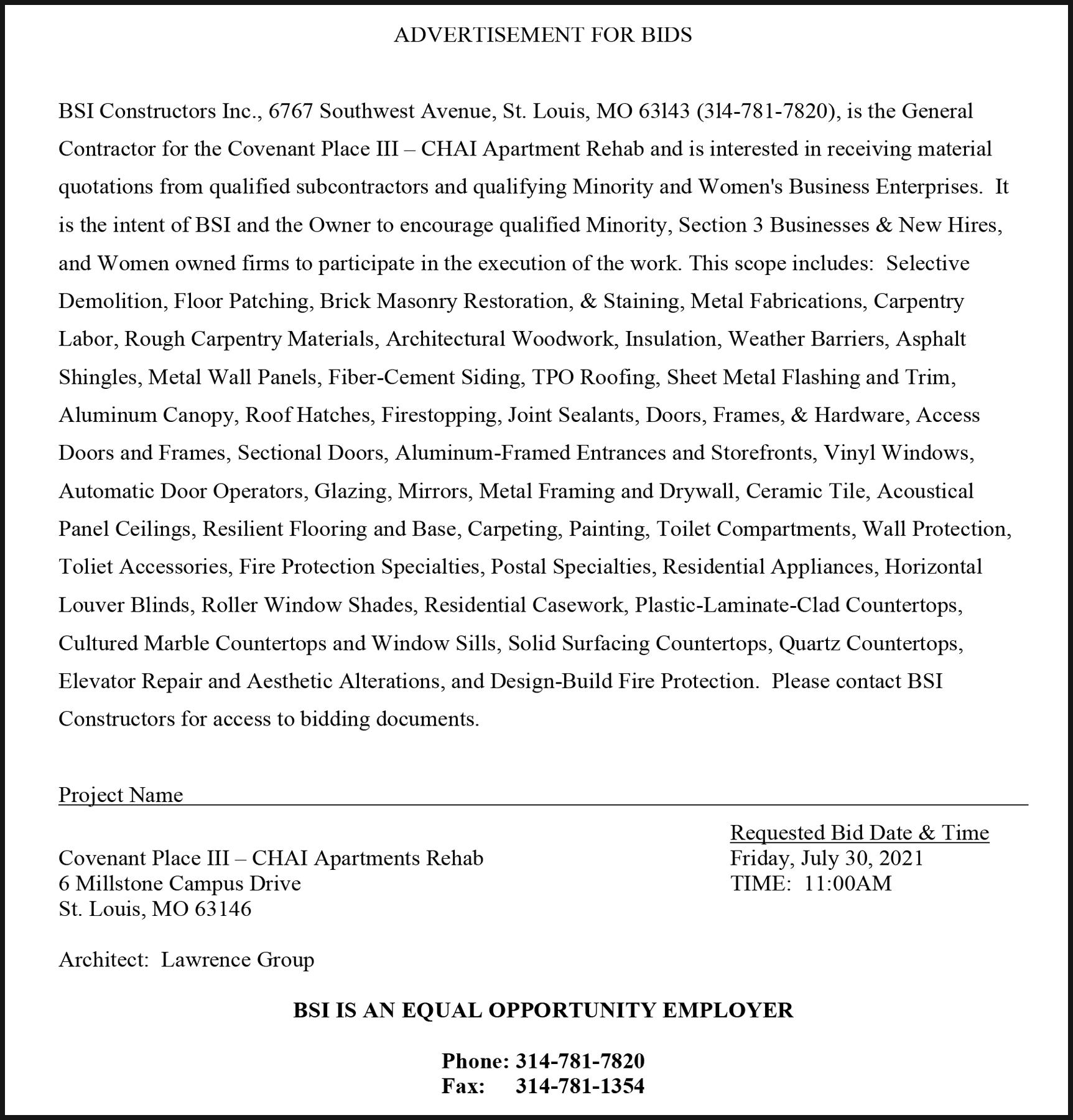
3049 Processing Facility – Notice is given that FiCON, Inc. St. Louis, MO, General Contractor, will receive proposals for the 3049 Processing Facility at 3049 Chouteau Avenue, St. Louis, MO 63103, including building infill for new food processing facility, until July 22, 2021, at 5:00 p.m. CDT. A live prebid walk through will be held on site on Tuesday July 13 between 8 and 11 a.m. Proposals will be accepted at FiCON, Inc.’s office at 181 Northwest Industrial Ct, Bridgeton, MO 63044 (314 427-4099), by mail, fax (314 427-6646), email (info@ficoninc. com), or hand delivery. Plans and specifications can be viewed at ficoninc.com and sldcplanroom.com
ADVERTISE YOUR BIDS WITH
Paric Corporation is seeking proposals for the following project: Missouri Teaching Hospital Fitout Space 2W for the University of Missouri in Columbia, MO.
This is the renovation of the 2nd floor of the Teaching Hospital. The project consists of approximately 7,770 SF of space and includes but is not limited to demolition, carpentry, architectural woodwork, fire stopping, Doors/frames/hardware, drywall, tile, acoustical ceilings, flooring, painting, fire sprinklers, plumbing, HVAC and electrical work.
This project has a diversity participation goals of 10% MBE, 10% combined WBE, DBE, Veteran Owned Business and 3% SDVE.
Bids for this project are due on July 12th, at 2:00 p.m. For any questions or would like to find out more detailed information on this opportunity, please contact John Davis at 314-704-6075 or jcdavis@paric.com.
All bids should be delivered to Paric via e-mail (bids@paric.com) or fax (636-561-9501).
PARIC CORPORATION IS AN EQUAL OPPORTUNITY EMPLOYER
The City of St. Louis will make available applications for the 2022 Community Development Block Grant (CDBG) funding cycle beginning July 27, 2021 and ending at 4:00 p.m. CST on August 27, 2021.
Beginning July 27, 2021, the 2022 CDBG Request for Proposals (RFP) and related documents can be found on the Community Development Administration (CDA) website at: https://www.stlouis-mo.gov/government/departments/community-development/
The 2022 CDBG funding proposal deadline is Friday, August 27, 2021, 4:00 p.m., CST.
Grants Management System Training and RFP Workshop
CDA utilizes a grants management system called EGrAMS to streamline grant processes and to allow organizations to apply for funding online. CDA will hold a virtual training session for organizations interested in applying online via EGrAMS. CDA will host a workshop to answer questions on the RFP on Monday, July 26, 2021 at 9:00 a.m.
Instructions for attending the Virtual Training and RFP Workshop Session are available on the website: https://www.stlouis-mo.gov/cda/
Questions concerning the RFP process may be submitted to the Community Development Administration at CDBG@Stlouis-mo.gov
CDA is an equal opportunity Agency. Minority participation is encouraged.
Notice is hereby given that The Metropolitan St. Louis Sewer District (District), the Owner, will receive sealed bids for Lemay Public I/I Reduction and Rehabilitation (2022) Contract A under Letting No. 12590-015.1, at its office, 2350 Market Street, St. Louis, Missouri 63103, until 2:00 PM, local time, on Thursday, August 12, 2021. All bids are to be deposited in the bid box located on the first floor of the District’s Headquarters prior to the 2:00 p.m. deadline. Bids may, however, be withdrawn prior to the opening of the first bid. BIDS WILL BE PUBLICLY OPENED AND READ IMMEDIATELY AFTER THE BID DUE DATE/TIME AT 2350 MARKET STREET.
The Work to be performed under these Contract Documents consists of: The work to be done under this contract consists of the rehabilitation of approximately 42,107 lineal feet of sanitary sewers, varying in size from 6-inch to 42-inches in diameter using cured-in-place pipe (CIPP) methods, 20 manholes, and 572 service connections. The project is within the Metropolitan St. Louis Sewer District Boundaries, inside the city(ies) of Maplewood, Richmond Heights, Shrewsbury, and Webster Groves, in the State of Missouri. The work will be per formed in various quantities at various sites.
All prospective bidders must prequalify in the Cured-In-Place Pipe (CIPP) category, and be certified prior to the Bid Opening. Prequalification forms for obtaining said certification may be obtained from the Owner at the above mentioned address. All bidders must obtain drawings and specifications in the name of the entity submitting the bid.
This project will be financed through the Missouri State Revolving Fund, established by the sale of Missouri Water Pollution Control bonds and Federal Capitalization Grants to Missouri. Neither the Missouri Department of Natural Resources, its divisions, nor its employees will be party to the contract at any tier. Any Bidder whose firm or affiliate is listed on the GSA publication titled “List of Parties Excluded from Federal Procurement or Non-Procurement Programs” is prohibited from the bidding process; bids received from a listed party will be deemed non-responsive. Refer to Instructions to Bidders B-27 for more information regarding debarment and suspension.
Nondiscrimination in Employment: Bidders on this work will be required to comply with the President’s Executive Order 11246. Requirements for bidders and contractors under this order are explained in the specifications.
Plans and Specifications are available from free electronic download. Please go to MSD’s website and look for a link to “ELECTRONIC PLANROOM.” Plans and Specifications are also available for viewing or purchase at Cross Rhodes Reprographics located at 2731 S. Jefferson Ave St Louis, MO 63118. The Metropolitan St. Louis Sewer District is an Equal Opportunity Employer.
The Metropolitan St. Louis Sewer District is an Equal Opportunity Employer and invites the submission of bids from Women and Minority Business Enterprises.
Bids for Roof
R e p l a c e m e n t , Kennett Readiness Center, Project No. T2002-01, will be received by FMDC, State of MO, UNTIL 1:30 PM, 7/22/2021 via MissouriBUYS.
Bidders must be registered to bid. For specific project information, go to: http://oa.mo.gov/ facilities
Bids for Replace
MSHP Troop E H e a
N
. R2111-01, will be received by FMDC, State of MO, UNTIL 1:30 PM, 8/5/2021 via MissouriBUYS.
Bidders must be registered to bid. For specific project information, go to: http://oa.mo.gov/ facilities
PJ Hoerr, Inc is Soliciting Bids
MBE/WBE/DBE/Veteran/ SDVE for the following:
University of Missouri Teaching Hospital- CT Replacement 2E07
Contact: Mike Murray, mikem@pjhoerr.com
Phone: 573-682-5505
Altman-Charter Co., requests subcontractor/supplier proposals for the Renovation of Winter Garden Senior Apartments in St. Louis, MO. This is the renovation of 112 units and common areas throughout the building. Proposals are due at the office of Altman-Charter Co., 315 Consort Dr., St. Louis, MO 63011 on or before Thur., July 22, 2021 at 3:00 PM (CT). Qualified Minority, Section 3, and Women owned businesses are encouraged to submit proposals. Plans can be viewed at FW Dodge, Construct Connect, SIBA, MOKAN, Cross Rhodes Reprographics and the Altman-Charter plan room in St. Louis. Bidders should contact Mr. Greg Mehrmann with any questions or to submit a proposal at gregm@altman-charter.com. Our telephone # is (636) 207-8670, and our fax # is (636) 207-8671.
The following people are in debt to Gateway Storage Mall of Belleville. The contents of their storage unit(s) will be sold at auction to compensate all or part of that debt.
Auction at the Belleville Royal Heights location will be held online with www.storageauctions.com on, July 27th 2021, at 10:00 AM. A cash deposit will be REQUIRED for all winning bids. Royal Heights --Belleville: F04 – Twansley Lashley
For all rules, regulations and bidding process, please contact www. storageauctions.com . All other questions, please call 618-233-8995 or mail: 17 Royal Heights Center, Belleville, IL 62226.
Sealant Replacement Argyle Garage
Will be received by City of St. Louis Treasurer UNTIL 3:00PM 7/29/2021
For specific project information, go to https://www.stltreasurer.org/ Request for Proposals/
K&S Associates, Inc. is soliciting MBE/WBE/SDVE/DBE/VBE for the following projects for July, STL CO Police #3, Special School District-So County Technical HS & City of Olivette-Warson Park –Plans and Specs can be viewed at www.ksgcstl.com-submit bids to estimating@ksgcstl.com or Fax 314-647-5302
FERGUSON-FLORISSANT
SCHOOL DISTRICT
FFSD is requesting bid proposals for Engineering Services until Fri, July 23, 2021, 11:00am CST.
Bid specs obtained online at http://new.fergflor.k12. mo.us/facilities-rfq
Contact/Attention: Terry O’Neil 314-824-2091
Notice is hereby
Bids for HVAC R e n o v a t i o n , Albany Regional Office, Project No. M1905-01, will be received by FMDC, State of MO, UNTIL 1 : 3 0 P M , 7/15/2021 via MissouriBUYS. Bidders must be registered t o b i d . F o r specific project information, go to: http://oa.mo. gov/facilities
Bids for Replace E
y Generator, Power
located at 2731 S. Jefferson Avenue, St. Louis, MO 63118 or at www.stlmsdplanroom.com. All bidders must obtain a set of plans and specifications in order to submit a bid in the name of the entity submitting the bid. The Metropolitan St. Louis Sewer District is an Equal Opportunity Employer.
All bidders must obtain a set of plans and specifications in order to submit a bid in the name of the entity submitting the bid.y submitting the bid. The Metropolitan St. Louis Sewer District is an Equal Opportunity Employer.
GATEWAY SCIENCE ACADEMY of ST LOUIS-Agreement No: 115-916 is accepting proposalsfor Fixed Price Food Service Management Company Services for the 2021-2022 school year. The proposal i s due on or before 10:00 am local time on Monday, July 12, 2021. Bid packages may be acquired by contacting Harun Cilingir, Operations Manager, at 314-546-0074 or by emailing request to hcilingir@gsastl.org


Center, Mineral Point, MO Project No. C1923-01 will be received by FMDC, State of MO, UNTIL 1:30 PM, July 22, 2021 For specific project information and ordering plans, go to: http://oa.mo. gov/facilities FOR RENT Ferguson, Cable, A/C, $150/wk 314-203-0302

ST LOUIS, MO 63112
July 30, 2021 @ 4PM

Questions regarding the scope of work should be directed, in writing, to Michael Stiebel, McClure Engineering, mstiebel@mcclureeng.com. Questions over the phone will not be accepted.
The Owner reserves the right to waive informalities in bids and to reject any and all bids.
Construction Estimates: $60,000 - $100,000
FOR BIDS
Sealed Bids for:
Will be received by the Administration of the St. Louis Art Museum, Owner, at 1 Fine Arts Drive, St. Louis, Missouri 63110 at 2:00 p.m. on August 12, 2021. The bids will be privately opened and read. Bids from certified M/WBE contractors are encouraged.
Electronic copies of the drawings, specifications and other related contract information will be available beginning on July 13, 2021 and may be downloaded at no cost from Sharepoint (https://bit.ly/3yudY1W).
A mandatory Pre-Bid Meeting will be held on Thursday, July 15, 2021 at 9:30 a.m. on the West Loading Dock, 1 Fine Arts Drive, St. Louis, Missouri. Masks will be required for all non-vaccinated attendees.
Questions regarding the scope of work should be directed, in writing, to Jeff Scott, McClure Engineering, jscott@ mcclureeng.com. Questions over the phone will not be accepted.
The Owner reserves the right to waive informalities in bids or to reject any and all bids.
Construction Estimate: $400,000
Advertised herein is subject to the Federal Fair Housing Act, which makes it illegal to advertise any preference, imitation, or discrimination because of race, color, religion, sex, handicap, familial\status, or national origin, or intention to make any such preference, limitation, or discrimination.“We will not knowingly accept any advertising for real estate which is in violation of the law. All persons are hereby informed that all dwellings advertised are available on an equal opportunity basis.” Call Angelita Houston at 314-289-5430 or email ahouston@stlamerican.com to place your ads today!
Continued from B1
vision to where it needs to be. Putting quality where it needs to be in the city is always my goal.” In addition to his short film, GQU3 released a spoken word six-song EP last year on Valentine’s Day titled “Vintage.” Like the production, his inspiration came from his own love life experiences.
“I knew I wanted to make a visual for it that put everything together,” GQU3 said. “I feel like the tracks were perfect.” Brown experimented with the cinematography showcased in the film. One scene includes a light juxtaposition of red lights shining in a bedroom with purple meeting in the middle and blue lights in the hallway. He said the shadows beaming toward the bedroom are part of why he thinks the project is a classic.
“It’s really powerful for the city. Total flip of the script on what is normally seen in the art community here,” Brown said. “This film is a ‘think’ piece in itself. When you focus on what is art, you’re gonna have so many art pieces in this film.”
GQU3 said his next project, “Trapoetry,” is a combination of rap and poetry. A lot of his earlier work was mainly spoken word, but this one will showcase more storytelling and penmanship skills with rap.

Photo courtsey of C-Dot Visuals
In addition to his short film, QGU3 released a spoken word six-song EP last year on Valentine’s Day titled “Vintage.” Like the production, his inspiration came from his own love experiences.
“I’m leaning more toward the rap side of things now and just working on releasing more new content and music,” GQu3 said. GQU3’s short film “Lust For Life,” can be watched on
YouTube. For more information about him and his music, visit www.gqu3.com.
Continued from B1
or past detrimental circumstances that have impacted their lives.
Since launching in May 2020, more than 700 men have joined the STR8 Mental meetings, which are on Zoom from 2-4 p.m. on the last Sunday of the month.
Brad Edwards, community organizer of Dear Fathers, said the sessions offer men a first exposure to therapy since most of them have never seen a therapist.
“They see they can talk with other Black men about what they’re going through and they can talk with a therapist who looks like them and can relate to them on all levels,” Edwards said.
Oftentimes, there’s a stigma that surrounds Black men and mental health. Many think they have to mask their pain and uphold this hard “tough guy” image, but that’s the beauty of Dear Fathers. Barriers are broken down and men have a
Continued from B1
“It’s not just about standing at the bar and doing a plié,” Sherman said.
(Pronounced ‘plē’ā,’ it is a basic step in ballet that involves bending your knees.)
“But it’s about respect, attention and being able to listen and learn.” Sherman continued.
Douthit-Boyd said he hopes the masterclasses will bring diversity and expose both girls and boys to ballet.
“My first time taking ballet [was] with a room full of girls, so hopefully this is something that these young dancers can come into and explore,” Douthit-Boyd said.
safe space where they can be vulnerable and share what’s bothering them.
“I don’t think as Black men we want to be the way that we are perceived as hard and rugged all the time,” Edwards said. “I think we just have to be in the right space for guys to feel safe and I think that’s what we’ve created here.”
Alex, who aspires to someday be a father, believes that his interactions with other fathers like Edwards and the other men in the group have shown him examples of the type of father he wants to become.
“Since starting this platform and hearing the stories from fathers I don’t know or just being close-knit with guys like Edwards, Johnson and Ricky Hughes Jr. I’m learning from them all,” Alex said.
“I think understanding who I am and being in a place where I can show up for my kids will help me be a great dad since I didn’t have that growing up.”
Edwards, who grew up with his father in his life and is a first-time father of a one-yearold daughter, said he wants to show other men in the group
what a great Black father looks and acts like.
“I had an example of what a great Black father looks like and I wanna help the other guys realize what that is,” Edwards said. “I want to give them the tools and gifts I learned from my father and build a community that way.”
The camaraderie and bonds formed through Dear Fathers are evident and its impact is something that Alex and Edwards both agree they want to continue.
“One thing we’re noticing is people are really buying into the fellowship and the brotherhood aspect of the community,” Edwards said. “I think it’s understanding that guys are really appreciative of what we’re doing and really want to tap into that some more.”
Dear Fathers also has a book club called Books and Bourbon, which meets 7-8:30 p.m. the second Wednesday of each month.
Black men can gain access to Dear Father’s monthly newsletters, virtual events, podcast episodes and more by visiting www.dearfathers.com/join.
An intermediate ballet masterclass will be held from 10-11:30 a.m. on July 14 at COCA. The advanced ballet masterclass will be from noon1:30 p.m. on July 14 at COCA. Reservations are required for the intermediate and advanced ballet classes. Currently, the advanced class is booked, but there is a waitlist available at COCA’s website. The intermediate class has two openings. The waitlist for the advanced class and registration to the intermediate class is available at www.cocastl.org/abt/. Members of the Boys and Girls Club were scheduled to meet with a COCA dance instructor July 6-8 to prepare for a performance with an ABT dancer. The final performance is 11 a.m.-noon July 13 at the Boys and Girls Club north grand facility. ABT Across America’s performances in St. Louis will be at 5:30 p.m. and 8:30 p.m., Wednesday, July 14, at the Shakespeare Glen in Forest Park. Students from the Boys and Girls Club will be attending the second performance. The other tour cities are Lincoln, Nebraska; Iowa City, Iowa; Chicago; Minneapolis; Charleston, South Carolina; Middleberg, Virginia; and New York. The event is free and open to the public, no reservations are required.
For additional information contact the Shakespeare Festival Box Office at info@ stlshakes.org or call (314) 2873348.




Collectively, we’ve all paused to assess and adjust as we navigate a new normal amidst the COVID-19 pandemic. Unfortunately, yet understandably, this has included a pause in consistent medical care for some. Nearly half of Americans surveyed by the Kaiser Family Foundation say they or a family member have skipped or delayed medical care because of the COVID-19 pandemic, which led to worsening conditions for many.
Among people with diabetes, according to an American Diabetes Association (ADA) and Thrivable survey almost half delayed seeking the routine medical care they need to manage their condition during the pandemic, mainly because they feared COVID-19 exposure. Yet delaying care and not regularly seeing a healthcare provider can increase the risk for serious complications for people
with diabetes. Furthermore, the Journal of the American Medical Association reports that the added stress from COVID-19 and avoiding the doctor can have tremendous psychological effects on people with diabetes that can ultimately impact how they manage their condition.
That’s why it’s important to know there are options to return to care safely, including in-person and telehealth visits. If you or a loved one lives with diabetes, developing a plan to safely return to care and resume consistent visits with your health care providers to check A1C levels can help maintain appropriate treatment and care. Contact your healthcare provider’s office to determine which type of visit, whether in-person or telehealth, is right for your return to care.
During an in-person appointment,
you and your healthcare provider can discuss A1C levels, diabetes management and treatment plans in the office as usual. If you are going to an in-person appointment, ask the office about its current process and recommendations for returning.
The CDC also has guidelines to protect yourself during the visit, including interacting with as few people as possible, keeping at least six feet of distance between you and others, wearing a mask and washing hands frequently.
Telehealth services have emerged as a way to triage, evaluate and care for patients without relying on in-person visits. During the pandemic, 40% of people with diabetes reported telehealth services made it easier to manage their diabetes, according to the ADA.
Among people with diabetes, according to an American Diabetes Association (ADA) and Thrivable survey, almost half delayed seeking the routine medical care they need to manage their condition during the pandemic, mainly because they feared COVID-19 exposure.
You should ask your doctor’s office whether an in-person visit or a telehealth visit is best for you.
During a telehealth visit, you can talk to your healthcare provider about A1C levels, diabetes management and your treatment plans as usual. To inform this more holistic conversation, you should get your A1C tested at an on-site facility or use an at-home A1C test. For more tips and resources on how to prepare for a telehealth appointment, visit lillydiabetes. com/telehealth.
It can also be helpful to connect with those who share your experiences. Join the conversation and encourage others to return to care by sharing how you’re safely returning to your regular healthcare visits to manage your diabetes –whether in-person or virtually – using #ReturnToA1C on social media.
Lead scorer of the University of Pittsburgh women’s basketball team, Latia Howard, was being recruited by the WNBA and at the top of her game. But that all changed after she suffered a stroke at just 21 years old.
Early one morning, Howard began experiencing weakness in her arm and leg. While she decided to skip practice that day, she didn’t think too much of it. When her roommate told her trainer why Howard wasn’t at practice and what she was experiencing, he called her and noticed she didn’t sound right on the phone. He went straight to her apartment, and after realizing something was very wrong, he immediately called 911 and she was rushed to the emergency room.
According to the American Stroke Association, African Americans have a higher prevalence of stroke and the highest death rate from stroke than any other racial group. Among stroke survivors, African Americans are more likely to be disabled and have difficulties doing daily activities.
A star athlete before her life-changing stroke, not only was Howard unable to play basketball afterward, she had to relearn how to walk and talk and went through extensive physical therapy, and fell into a depression.
The stroke forced Howard to re-imagine her goal of being a professional basketball player. She shifted her dream of playing in the WNBA to coaching young, up-and-coming basketball players.
“I am grateful I am here and can share my story,” says Howard, who, now 43, is an educator and basketball coach. “I encourage my team to always give 100% because at one time in my life, I couldn’t give anything.”
A testament to the fact that stroke can happen to anyone, of any age, at any time, Howard encourages everyone to know their body, so they can recognize when something feels different or wrong. “When it comes to stroke, every moment counts,” she says. “A person could lose everything to stroke, so it’s important to call 911 the moment something seems off.”
The Centers for Disease Control and Prevention (CDC) reports that almost half of African Americans have at least one risk factor for stroke, including manageable conditions like high blood pressure and diabetes, as well as genetic conditions like sickle cell disease. That is why it’s important for everyone to be

aware of their risk factors and learn the signs to watch.
According to experts, immediate medical attention is vital when it comes to stroke and relies on everyone learning and being able to recognize the BE FAST signs and symptoms of a stroke in themselves and others and calling 911 immediately. BE FAST stands for
Eyes,
• Balance: Sudden loss of balance
• Eyes: Loss of vision in one or both eyes
• Face: Face looks uneven or droopy
• Arm: Arm or leg is weak or hanging down
Lead scorer of the University of Pittsburgh women’s basketball team, Latia Howard was being recruited by the WNBA and at the top of her game. But that all changed after she suffered a stroke at just 21 years old.
• Speech: Slurred speech, trouble speaking or seems confused
• Time: Immediately call 911
For more information and resources, visit StrokeAwareness.com, developed by Genentech Inc, a member of the Roche Group.

Only about 7.5 million people in the U.S. have policies that pay long-term care benefits, according to the American Association for Long-Term Care Insurance, but more than half of Americans turning 65 are projected to need some type of long-term care in the future.
Americans are living longer than ever before, and with continually rising health care costs, the need for a long-term care solution becomes more of a “when” than an “if” situation, according to financial experts, who warn that Americans are largely waiting too long to plan and prepare.
“Many people wait until they’re in their 50s or 60s before beginning long-term care planning, but with costs rising, it’s important to start planning when you’re younger and healthy,” says Heather Deichler, senior vice president, MoneyGuard product management, Lincoln Financial.
To get prepped, consider these tips from Lincoln Financial:
• Plan early: Only about 7.5 million people in the U.S. have policies that pay long-term care benefits, according to the
American Association for Long-Term Care Insurance, but more than half of Americans turning 65 are projected to need some type of long-term care in the future. This disparity could be due to the fact that many underestimate longterm care costs and expect to rely on savings or Medicare and Medicaid to cover them.
Those in the know – financial planners – see medical/healthcare costs and long-term care expenses as bigger risks to retirees’ savings than spending too much, inflation or the economy. Indeed, a majority of consumers in a recent survey conducted by Versta Research on behalf of Lincoln Financial guess that a private room in a nursing home costs less than half the realistic estimate. Others may simply feel their good health exempts them from the need to plan at all. But living a healthy lifestyle
could mean you’ll live longer and face health-related risks associated with aging. Being realistic about the possibility your future could involve long-term care and the true costs associated with it can help you plan accordingly and motivate you to get started early.
• Get on the same page as your family: Having a long-term care conversation with loved ones can help you feel confident about your future and help avoid conflict among family members. Share your expectations for daily living, such as how and where you want to receive care. This is a good time to identify who will be responsible for your financial and medical affairs should you become unable to manage them.
• Consult a financial professional: A financial professional can help you get
a handle on your financial future and make you aware of all your options, including those that evolve with your needs. They may point you to solutions that can help cover qualified long-term care expenses. Some solutions can offer more options and flexibility with a guaranteed level of protection and the possibility for investment growth. For example, in addition to obtaining care in an assisted living facility or nursing home, you could have the flexibility to receive care at home, including from family members.
Comprehensive long-term care planning with family members and a financial professional now can help ensure everyone is prepared for the emotional and financial decisions that may need to be made in the years ahead.
When the vaccine rollout began in December 2020, Ashley Denmark, DO, BJC Medical Group family medicine physician, was in the first phase for vaccination as a health care worker.
She received her first injection of the Pfizer-BioNTech vaccine in December 2020 and her second in January 2021. “I was ready for side effects, but I didn’t have any at all,” she said.
As a frontline worker and a parent of a daughter with asthma, Dr. Denmark said being vaccinated has provided her family with some relief knowing she’s protected. “I was proud to get the COVID-19 vaccination.”
As a member of the African-American community, Dr. Denmark hears concerns about the vaccine’s safety from those who are hesitant to get vaccinated. She has been working to change community sentiment by talking to her Black patients about the virus and what they can do to protect themselves.
“I acknowledge the history of bias between the Black community and health care system,” she said. “Then I talk with them about how the Black community has been severely affected by the virus and how we are more likely to become sick and hospitalized.”
Dr. Denmark also talks about Dr. Kizzmekia (“Kizzy”) Corbett, an AfricanAmerican woman and one of the National Institutes of Health (NIH) scientists who worked to develop and produce the Moderna COVID-19 vaccine, which uses the same technology as the PfizerBioNTech vaccine.
“I tell patients that an AfricanAmerican woman developed this vaccine, and she is the NIH’s lead scientist for coronavirus research.”
While Dr. Denmark urges people to talk to their doctors about their concerns, she said that the best way to protect the community and reduce the virus is through vaccinations. “I tell my patients to get vaccinated like I did because the vaccine can save lives, especially in Black communities where people are dying at higher rates from the virus.”
As Dr. Denmark reflects on 2020, she acknowledges the challenges we’ve all faced and is hopeful for the future as we see more people receiving the vaccine.
“I look forward to celebrating after friends and family receive the vaccination.” Dr. Denmark said. “My greatest hope is to return to a space of normalcy where we can care for each other.”
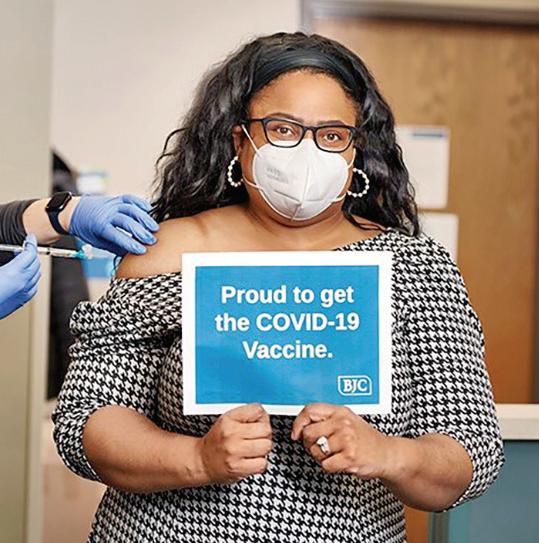
As a member of the African-American community, Dr. Ashley Denmark hears concerns about the vaccine’s safety from those who are hesitant to get vaccinated. She has been working to change community sentiment by talking to her Black patients about the virus and what they can do to protect themselves.
To schedule a vaccine at one of BJC’s three public vaccination clinics, visit bjc. org/vaccines. Some local vaccination locations are listed below. For additional vaccine locations and resources, visit vaccinatestl.org.
Christian Hospital – Detrick Auditorium 11133 Dunn Road
Friday & Saturday
8 a.m. – 4 p.m. (scheduled appointments)
Walk-ins accepted 9 a.m. – 3 p.m. only
Clayton Avenue Building 4353 Clayton Ave. Suite 172
Tuesday & Saturday
8 a.m. – 4 p.m. (scheduled appointments)
Walk-ins accepted 9 a.m. – 3 p.m. only
Wentzville Convenient Care 1520 Wentzville Parkway seven days a week
9 a.m. - 6 p.m.
Scheduled appointments only, no walk-ins
More than 2.7 million American children are growing up in grandfamilies – families in which grandparents, other adult family members, or close family friends are raising children. A new report highlights how the pandemic has amplified their unique challenges, and offers solutions to better serve them.
n More than 2.7 million American children are growing up in grandfamilies – families in which grandparents, other adult family members or close family friends are raising children.
The report, “Facing a Pandemic: Families Living Together During COVID-19 and Thriving Beyond,” authored by the non-profit Generations United and funded by the Robert Wood Johnson Foundation and Casey Family Programs, points out that at a time when older adults are being cautioned to keep their distance from children because of the heightened risk of infection and death from COVID-19, for grandfamilies, that distance is impossible. Advocates point out that these caregivers are the first line of defense for children during the pandemic, having stepped in when parents cannot raise them for many reasons, including cases where children’s parents have died from COVID-19. At the same time, 30% of kin caregivers lack an alternative caregiving plan if they should die or become disabled, a troubling statistic in the face of the pandemic, which disproportionately affects older adults.
While grandfamilies are diverse in geography, income and race, the report finds that caregivers in grandfamilies are disproportionally Black or Native American; nearly half of grandparent caregivers are over age 60; and one in four grandparent caregivers has a disability. These are the same populations that are more likely to be impacted by the pandemic and die as a result.
“While we’re all impacted by COVID19, grandfamilies, especially, have had tough realities, with limited support systems,” says Donna Butts, executive director of Generations United, a non-profit with the mission of improving the lives of children, youth and older people. “State and local child welfare and other agencies must better support them during COVID19 recovery and beyond.”
Federal, state and local governments recognize foster families and provide

About 19% of grandparents responsible for grandchildren live in poverty and 38% of grandfamilies are unable to pay or are worried about paying mortgage or rent.
them with access to resources, but there is little available for grandfamilies raising children outside of foster care. While Congress included support for grandfamilies in the December 2020 COVID-19 relief package, including better access to kinship navigator programs, which help connect families to information and community support as well as provide some direct help to families to meet emergency needs, advocates say this is just a start.
“With so many families continuing to struggle with impacts from COVID19, it’s critical that state and local child
welfare agencies distribute the funds in this package,” says Butts. “Congress also needs to ensure families have ongoing financial support so that caregivers can meet the basic needs of children as they live with the long-term impacts of COVID -19.”
The report also finds that about 19% of grandparents responsible for grandchildren live in poverty and 38% of grandfamilies are unable to pay or are worried about paying mortgage or rent. Among the solutions to these figures, Generations United is calling for grandfamilies to be
specifically named in the next COVIDrelief package as an eligible population for financial relief such as Temporary Assistance for Needy Families (TANF). To access the report, visit www. gu.org. To hear grandfamilies discuss the pandemic’s impacts, visit everyfamilyforward.org.
While the pandemic has heightened the inequities different types of families face, advocates say that sufficient support can help grandfamilies recover and thrive.


Many schools, local libraries and other entities dedicated to childhood literacy host annual summer reading challenges. Encourage your kids to not only participate, but to actively choose books they are looking forward to reading.
School is out and already parents are hearing the dreaded, “I’m bored.” Unfortunately, too much mental downtime in summer can leave kids floundering in fall.
To keep minds active all summer long, check out these brain energizing tips and ideas:
• Take a hike: Whether your children were learning remotely or in-person this past school year, they are likely due for some quality time spent outdoors. Take a hike with your kids or go on a camping trip. Exploring the natural world offers
a geology, biology and ecology lesson wrapped up into one experience.
• Make math fun: Keep students’ mathematics skills honed during the summer months by visiting the Casio Education website. Found at casioeducation.com/activities, this free resource features tons of tools that help incorporate technology into mathematics learning. Plus, Casio’s free all-in-one web-based mathematics software ClassPad.net offers a personalized approach to math and can be fun for kids to use whether on a road trip or home on a rainy day. Finally,
Casio’s YouTube channel is another good summer resource, as it offers tutorials and webinars in a range of subjects, including elementary and middle school math, algebra I and II, geometry, pre-calculus, calculus and statistics.
• Hit up the library: Many schools, local libraries and other entities dedicated to childhood literacy host annual summer reading challenges. Encourage your kids to not only participate, but to actively choose books they are looking forward to reading.
• Get moving: Exercise is critical for a healthy brain, so make sure kids are moving each day. Take a bike ride together as a family, visit a playground or pool, round up the neighbors for a game of flag football – there are many fun ways to boost physical activity, particularly during the summer months. This summer, be sure you mix up the down time with opportunities to exercise the mind. Doing so will keep kids happy, entertained and intellectually challenged.
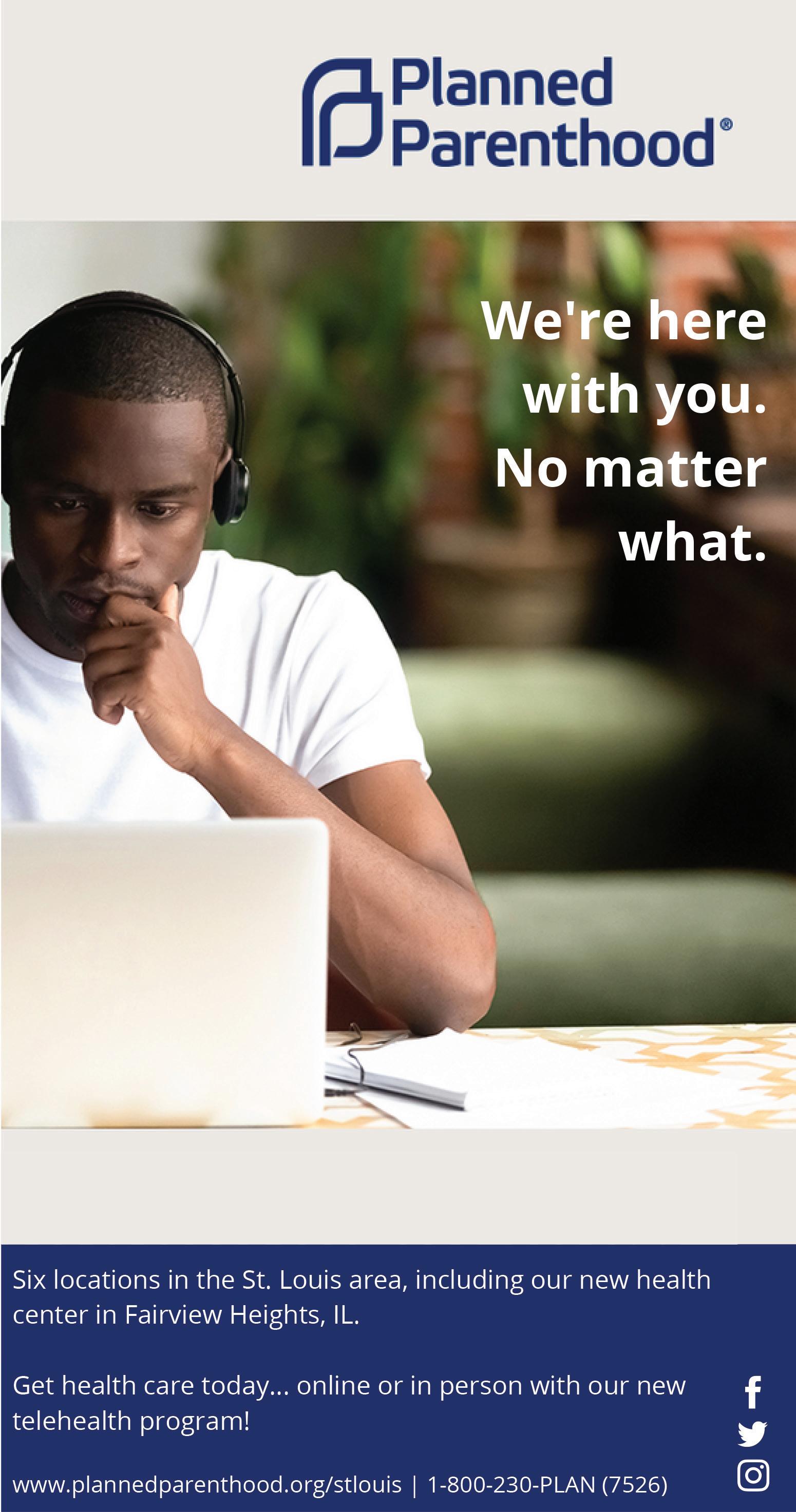
As you’re recovering from a heart attack, exercise might be the last thing on your mind. These helpful tips for exercising after a heart attack will get you back in your groove.
Many doctors agree that being physically active after a heart attack is an integral factor in preventing a second one. To get the best results, you just need to know how the right way to get the exercise you need.
Since recuperating from a heart attack entails allowing your heart to heal, it might be hard to grasp how exercise can help. Doesn’t exercise put your heart under stress?
The key to reaping the benefits of exercise, in this case, is to gradually rebuild the heart’s strength over time.
The first step in deciding which exercise routine is right for you is talking to your doctor. Even if you feel like you’re ready to start exercising, your doctor can guide you based on the state of your health.
Some persons need to do a form of cardio rehab before launching into physical activity on their own.
In this type of rehab, you work with nutritionists, physical therapists, and other specialists to gain your strength. They’ll take a holistic approach to your health, so all aspects of your recovery are addressed.
After your first heart attack, your doctor would have prescribed medications that are meant to address your heart’s health. It’s important that you stick to your regimen. If you think the medications are no longer effective, talk to your doctor. It’s never acceptable to just stop taking them as this may affect how well your heart functions and put you at serious risk.
Cigarette smoking has been proven to not only affect the lungs, but can also damage blood vessels, impair oxygen saturation, and cause blood clots. If you’re having trouble quitting, check out all the resources that are available as quickly as possible.
High cholesterol levels are a risk factor for having heart trouble. While eating well and exercising will go a long way in keeping your heart healthy, other interventions might be needed. Your doctor should monitor your cholesterol levels and prescribe medication if needed.
Generally, doctors will tell you to cut out unhealthy fats, excess salt, and refined sugars to help your heart. If you’re looking for a truly heart-healthy diet, though, the Mediterranean Diet could be just what you need. That diet focuses not only on reducing the bad foods but also on the foods that promote a healthy heart.
Studies show a strong link between diabetes and heart disease. If you have diabetes, keeping the condition in check will be integral to minimizing your risk of a heart attack, Bear in mind, however, that you can have diabetes without showing symptoms so get your blood sugar levels checked regularly.
The New York Times reports that a growing number of children under the age of 13 are experiencing emotional and mental health challenges related to the COVID-19 Pandemic. The Centers for Disease Control (CDC) recommends that parents and caregivers lookout for changes in the behavior of children, such as excessive worry, anxiety, and difficulty with attention and concentration.
“Everyone is struggling during COVID-19, adults and children alike,” says Dr. Jennifer Wessels, Chief Medical Officer for Home State Health, Centene’s Missouri health plan. “Children especially need help coping with today’s unusual environment and they need an appropriate way to work through their emotions.”
To help kids cope with the stressors brought on by the pandemic, Dr. Wessels developed a 17-page COVID-19 emotional learning activity book and journal for children, “Strange New World”, is a journal designed to promote the positive aspects of their lives, and to identify actions that they can take to have fun, boost their mood and turn to trusted adults when they need help. “The COVID-19 activity book can help young people address feeling about their changing world in small, manageable, and age appropriate ways,” Wessels adds. “Children feel more in control of their feelings and thoughts by writing them down.”
Dr. Wessels adds that children and teens are dealing with time away from friends and family, remote school, and in some cases the loss of a family member. The New York Times goes on to report that in 2020, the CDC released a study that looked at the proportion of children’s mental health-related emergency department visits between March and April of 2020, compared to the same period in 2019. The study shows that for children ages 5-11 years, mental health-related emergency department visits increased approximately 24%.
For the emotional activity book, Dr. Wessels built in a way for children to list out the good and happy things that happen during the day, and one section asks kids to write a note to themselves in the future. “It’s a way for the young person using the journal to record their feelings and experiences during this historic time,” she says. Kids are also asked to write about a time when they’ve helped someone, asking them to recall how it felt and how the action made the person feel.
Home State Health members can access “The Strange New World” online by visiting www.homestatehealth.com, and Centene, through a partnership with the Redbird Rookies, will distributing copies of the activity book to St. Louis area children. The Parkway School District is issuing copies of “Strange New World” to social workers and teachers in the district for their students. Dr. Erin Schulte, Coordinator of Guidance Counseling for Parkway School District, noted that exercises in the journal aren’t “overwhelming, and they are a great way to for kids to start processing feelings.” Dr. Wessels says the Missouri School Counselors Association also shares the journals with students across Missouri.
Dr. Jennifer Wessels is a St. Louis-based family physician who has served as Home State Health’s Chief Medical Officer since 2019.
The cover of Dr. Wessels’ 17-page COVID-19 emotional learning activity book and journal for children titled “Strange New World”. The journal is designed to promote the positive aspects of their lives, and to identify actions that they can take to have fun, boost their mood and turn to trusted adults when they need help.

